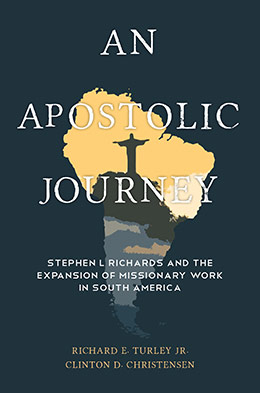Brazil
Richard E. Turley Jr. and Clinton D. Christensen, "Brazil," in An Apostolic Journey: Stephen L. Richards and the Expansion of Missionary Work in South America (Religious Studies Center, Brigham Young University; Salt Lake City: Deseret Book, 2019), 105–158.
Historical Background
Elder Richards became the first Apostle to set foot on Brazilian sand and soil. Missionaries first came to the country in 1927, and the Brazilian Mission was organized in 1935. For unknown reasons, President George Albert Smith did not direct that either Uruguay or Brazil be dedicated for the preaching of the gospel by Elder Richards. Perhaps the Apostles viewed Elder Melvin J. Ballard’s dedication for all of South America in 1925 as sufficient.
Reinvigorated from their calmer experience in Uruguay, the Richardses traveled by ship to Santos, Brazil, and from there by car to São Paulo. They stayed in the country from March 8 to March 23, 1948. As in Argentina, Elder and Sister Richards spent considerable time journeying to the branches by car and associating with the approximately four hundred members. Elder Richards’s heart problems and resulting fatigue increased in Brazil. Exhaustion in Curitiba led to an opportunity for Elder and Sister Richards to take an airplane ride to São Paulo. This was their first experience flying on an airplane.
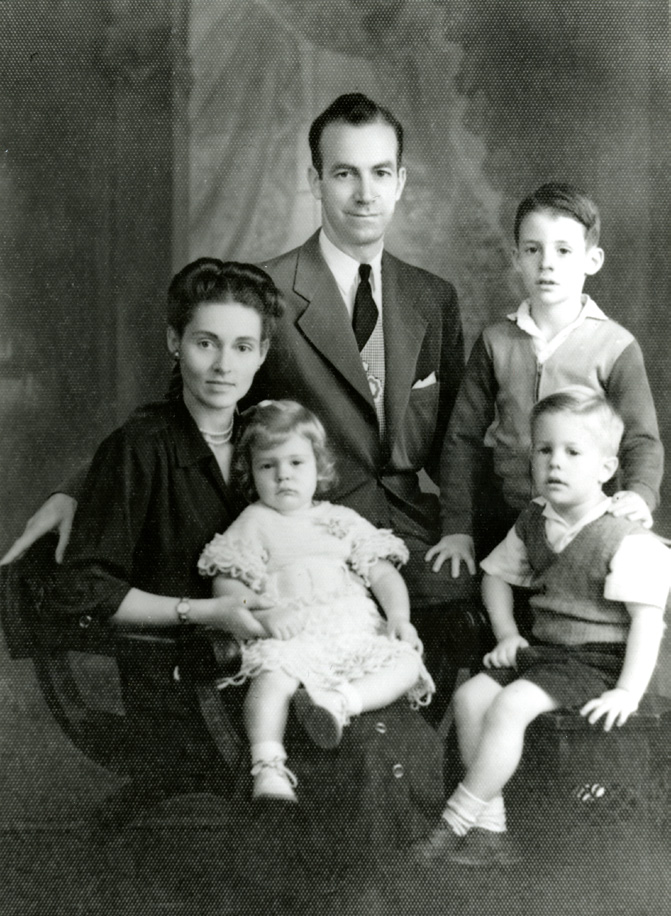 Harold and Diania Rex with children Yara, Jeff, and John (standing). Courtesy of CHL.
Harold and Diania Rex with children Yara, Jeff, and John (standing). Courtesy of CHL.
Travel in the three South American missions helped Elder Richards appreciate more fully the responsibility of missionaries and mission presidents to serve in such large countries. This increased awareness of their needs would help the work in South America after Elder Richards returned to Church headquarters and related his observations.
The Documents
One difficulty Irene Richards faced on the trip was access to stationery for correspondence. By the time she arrived in Brazil, she had obtained a new journal that would supplement the record of her experiences at the end of the trip. Some Brazilian entries are more difficult to decipher in the journal, so documentary editing marks and footnotes have been added to aid the reader.
In this chapter there is very limited information from Brazilian Mission President Harold Rex because of a dearth of records by him. Many insights into the Brazilian tour come from correspondences of President Rex’s missionary counselor Elder Wayne Beck and entries from missionaries, mission records, and newspaper articles.
ON BOARD SS URUGUAY OFF THE COAST OF BRAZIL
Sunday, March 7, 1948
Daily Summary
Sunday service on the ship
Irene M. Richards Letter[1]
Dear Louise:[2]
. . . Mrs. Britton, who was in charge of publicity, and whom we had met on the Argentina, asked Papa to speak at a service on Sunday. So he did, but he had to pray and preach and nearly sing. But we found a young lady who sang “Nearer My God to Thee”, and the congregation joined in “Onward Christian Soldiers”. It went off well and introduced us to the world for good or worse. We missed the missionaries who were on the Argentina coming down, who sang and prayed at our other meetings.
SANTOS AND SÃO PAULO, BRAZIL
Monday, March 8, 1948
Daily Summary
Itinerary, arrival in Brazil, view from hotel room, and travel to São Paulo
Elder and Sister Richards Itinerary in Brazil[3]
I T I N E R A R Y
March 8–9–10............ In São Paulo
March 11.................... Travel to Campinas, visit city and coffie ranch, 11o kilometers.
March 12.................... Travel to Riracicaba and Ribeirão Preto, conference in Ribeirão Preto, 290 kilometers.
March 13.................... Return to Campinas before noon. Attend baptism in afternoon and conference in evening.
March 14.................... Return to São Paulo before noon. Conference in afternoon; German meeting at 1:30; Portuguese meeting at 3:30 P.M.
March 15.................... Depart at 6:30 A.M. for Curitiba, 500 kilometers. Conference [cannot read the rest]
March 16.................... Travel to Joinville, 143 kilometers. Conference in evening.
March 17.................... Return to Curitiba. Visit city, conference in evening.
March 18.................... Conference with Missionaries.
March 19.................... Return to São Paulo.
March 20.................... Depart for Rio, if by automobile at 1 P.M, overnight at Club 200, arrive in Rio before noon on Sunday 21st. Train leaves São Paulo 10 P.M. arrives in Rio 9 A.M.
Irene M. Richards Journal[4]
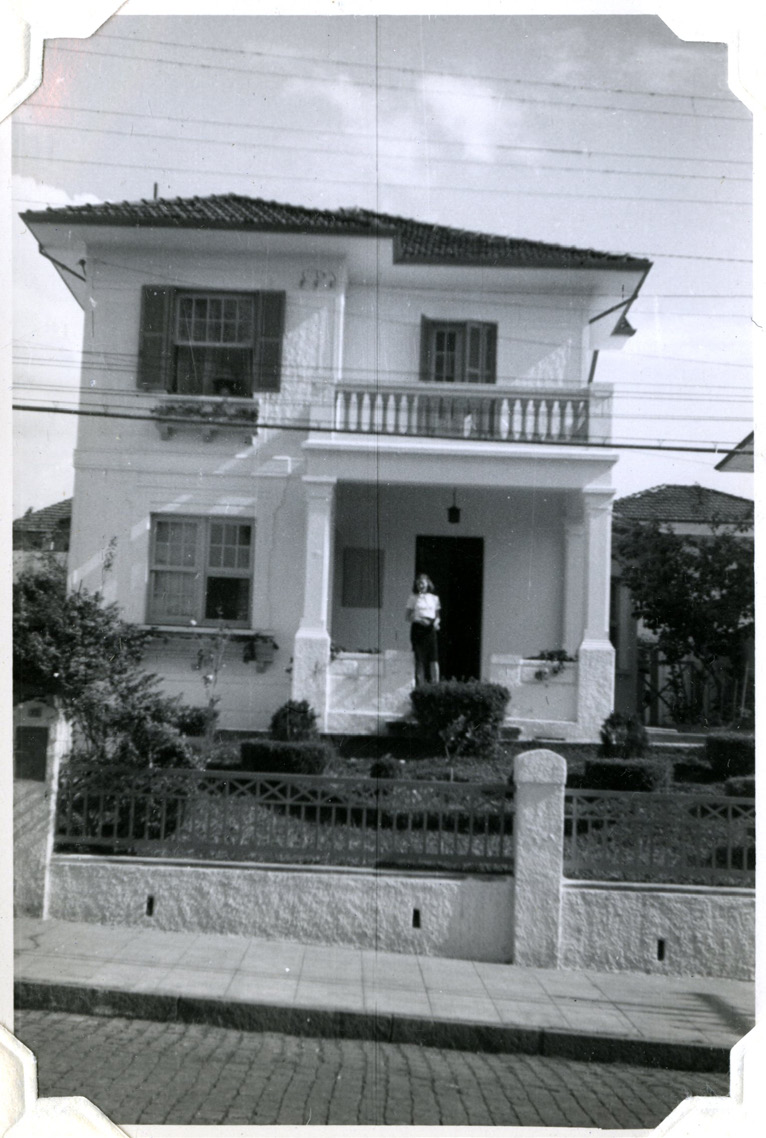 Sister Rex standing in front of the
Sister Rex standing in front of the
Brazilian mission home in São Paulo. Courtesy of CHL.
Entering Brazilian Mission
Mar 8, 1948 Santos [Brazil]
Monday and we passed the inspector, left the Uruguay. Bro DeJonge[5] was waiting for us at the bottom of the ladder. We chatted about an hour before some elders showed up. Then Pres Rex just in time for customs. Then we came to Sao Paulo. Our rooms are lovely and nearly stunned us they are so big. The view from the window is: Parking, then a foot bridge where hundreds are passing—another bridge in the distance and then town and mountains and clouds and sky. The people speak Portug[ue]se here. We are riding to see some new homes for the mission.
We saw two beauties—A reporter or two came to chat with Stephen and take his picture for the paper. A Brazilian and a negro. The negro seemed the most intelligent and educated. Sister Rex came with the Pres. and we enjoyed a visit in our lovely hotel suite.
Irene M. Richards Letter[6]
HOTEL SAO PAULO
Sao Paulo
March 11, 1848
Dear Louise:[7]
. . . President [Harold M.] Rex took us to this lovely hotel, because he is crowded at home and has a small family. We have a suite of two rooms, two halls and a bath, all furnished nicely. It tickles Papa’s pride to be sitting at a table in beautiful chairs, eating a nice light breakfast in his dressing robe. At first we tried to tell the waiter what to bring us, and after gesticulating vociferously we finally fell back on our pillows exhausted and wondered if he would show up with, cigars to put in our mouths, or a pot of “mate” which they suck thru a straw, but after an hour here came the waiter with a nice meal. It has been the same every morning, nothing we ordered but a uniform breakfast the hotel serves for everyone, and we can pick out plenty for us. Out from the corner window, we look over the center of town.
We will leave for the interior today and may be able to tell more about roads and conditions later. . . .
Lovingly,
Mother and Father.
Irene M. Richards Letter[8]
Sao Paulo, Brazil
March 10, 1948
Dear Allie:[9]
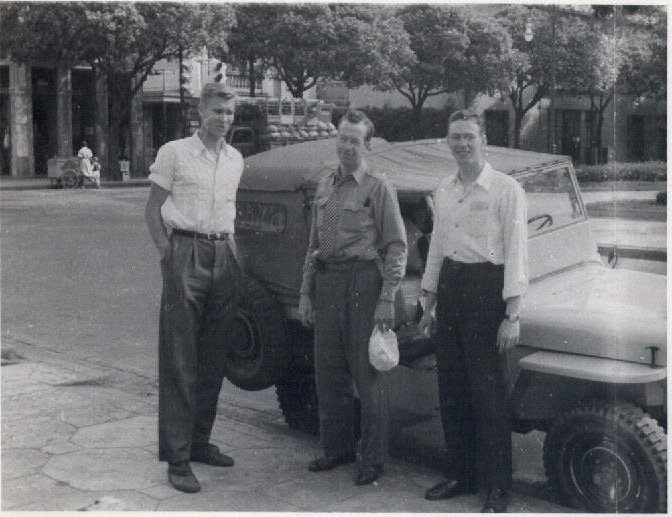 Elder Pinegar, President Harold Rex, and Elmo Turner standing in front of the mission jeep. Courtesy of CHL
Elder Pinegar, President Harold Rex, and Elmo Turner standing in front of the mission jeep. Courtesy of CHL
. . . From Santos we traveled 40 miles up through the hills, very scenic and a new road, to Sao Paulo, about 2800 feet and much nicer climate. We have a hotel room and it’s the nicest setup we have had. Really a suite, well furnished and comfortable. From a corner window on the 9th floor we see a mile or two in the distance, where buildings and trees finally fade out and the hills and sky come into view. There is a low avenue with four separate lanes parked and shrubbed up the bank to another level where a bridge arches the park. This bridge is crowded with people going back and forth on higher streets, and it’s on this level that many palms and trees make it interesting. We see up another avenue, steps leading to the other level also. Really there are ten streets meeting at this point, and when the autos begin to go home it’s more than the little man in the elevated box under an umbrella can do to control the traffic. There is a constant horn blowing for two hours, while autos jam and unwind and mix again until finally evening is here and the streets are clear again. We see many tall new modern buildings, some not finished yet, with shades and modern equipment, and many old ornamented ones with balconies where people, parrots, potted plants and what not spend the cool evenings, after the lights go on. We have seen many lovely homes here. But really a modern trend is going on and finally there will be a new place in this big land. People here don’t even know what the Bible is. They don’t care about anything much but to live, so it will be encouraging for the elders to search out the “honest in heart”. Several have said they have been looking for something like our gospel for a long time. It will surely help them to be somebody in the future. We have met some of the missionaries and heard their why’s and wherefores and testimonies, and Papa has given them advice and counsel as he can do and they seem thrilled. Tomorrow we will travel a little and in two weeks we will know more about Brazil. . . .
Lovingly,
Mother and Father.
SÃO PAULO, BRAZIL
Tuesday, March 9, 1948
Daily Summary
News article about the Church, and missionary meeting in São Paulo
News Article: Unidentified Newspaper[10]
Mormon Preacher
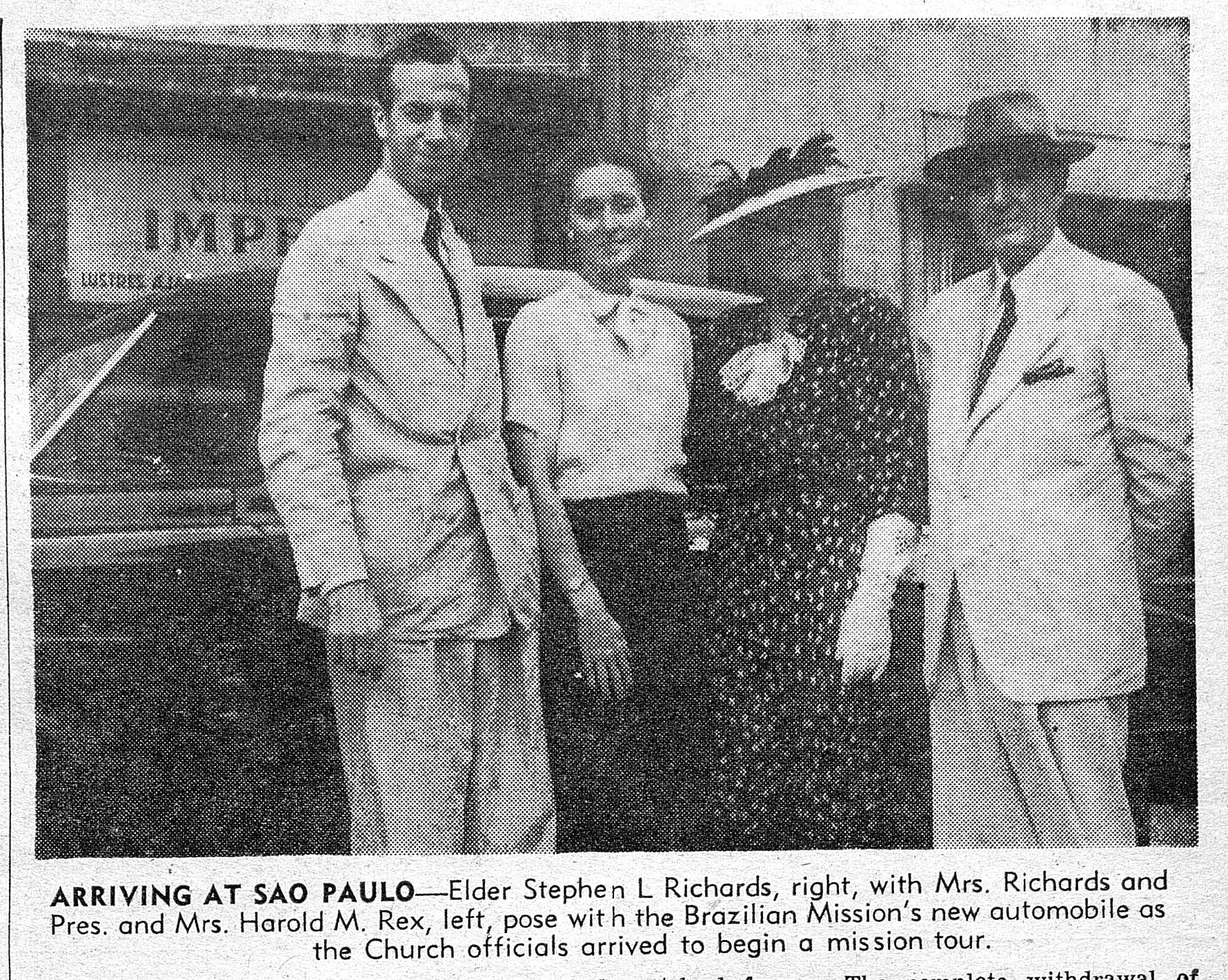 The Richardses arrrive in São Paulo and are greeted by the Rexes. Their new automobile is
The Richardses arrrive in São Paulo and are greeted by the Rexes. Their new automobile is
shown behind them. Courtesy of CHL.
Caption: Mr. Stephen Richards and wife with Mr. Alius and Mr. Rex
Mr. Stephen L. Richards, preacher of the Church of Jesus Christ of Latter-day Saints, is in São Paulo, accompanied by his wife Mrs. Irene Richards. Mr. Richards has come to our State to hold some conferences. He received the newspaper men in company of the missionaries Johannes Alius and Harold M. Rex. Mr. Richards said that the American sect, the Church of Jesus Christ of Latter-day Saints also called “Mormons,” was founded in 1830 in the United States by Joseph Smith, with the publication of his biblical book the “Book of Mormon.” Joseph Smith’s principal activity consisted of propagating the doctrine and constructing new temples. . . .
“We were in Uruguay having been received at the American Club of Montevideo. In Brazil, I am very much impressed. I intend to visit several states, holding conferences and propagating the doctrine. Tomorrow I intend to go to Campinas, where I shall hold a conference and on the 14th return to this city, holding a conference that day at 3:30 p.m. at 165 Rua Seminario 1st floor. Afterwards I will continue to Argentina.[11]
São Paulo District Minutes[12]
Missionary Meeting São Paulo District[13]
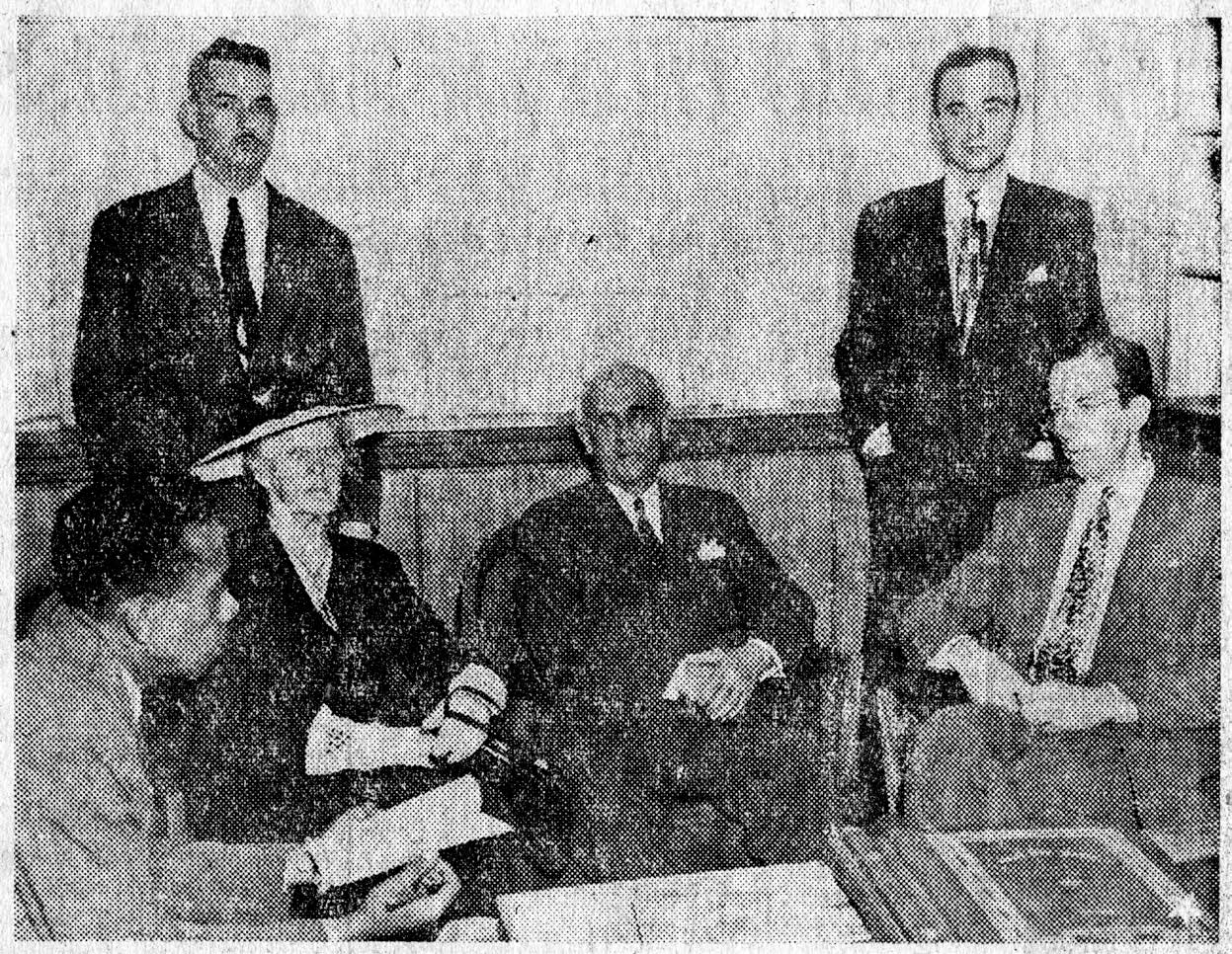 News clipping of the Richardses and President Rex visiting with a reporter. Courtesy of CHL.
News clipping of the Richardses and President Rex visiting with a reporter. Courtesy of CHL.
March 9, 1948
Song—The Spirit of God
Prayer—Elder Bynon D. Thomas
Brother Stephen L Richards outlined the meeting and gave a small piece of paper to each missionary requesting him to talk on those items, or, explain in a few words what he thought of these items. . . .
Brother Richards gave instructions to the missionaries cautioning them in the use of their time. He bore his testimony which was faith promoting to hear.
Song—We Thank Thee O God for a Prophet. (in Portuguese)
Prayer—Elder Orson Tew.
SÃO PAULO AND CAMPINAS, BRAZIL
Wednesday, March 10, 1948
Daily Summary
Brazilian Mission presidency meeting, ride to Campinas, and update by President Young from Argentina
Brazilian Mission Presidency Meeting[14]
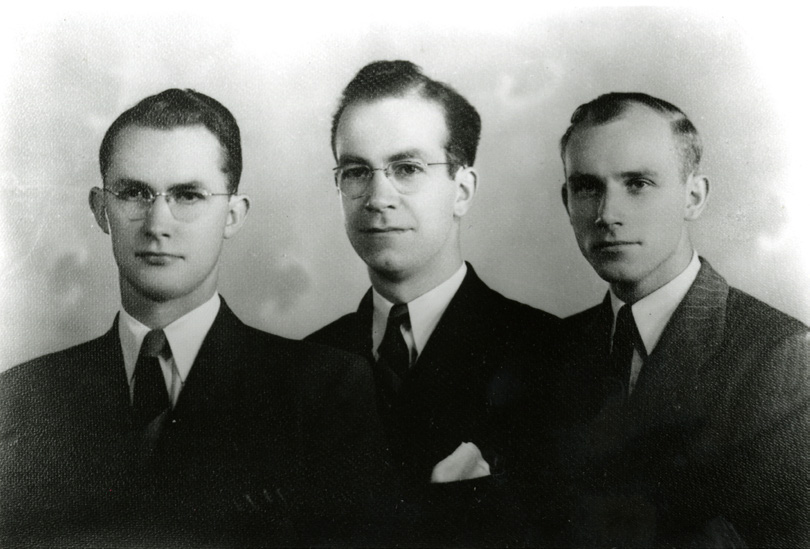 The Brazilian mission presidency. Courtesy of CHL.
The Brazilian mission presidency. Courtesy of CHL.
Minutes of Mission Presidency Meeting
March 10, 1948 at 2:30 p.m.
Presided over by Elder Stephen L Richards
Prayer: President Harold M. Rex
A Short discussion on prayer was given by Elder Richards. It was pointed out that no set condition for prayer was necessary, i.e. in a circle, all standing, or, all sitting. Particular mention was made that any form of prayer imitating prayer circles was wrong and should not be permitted.
Missionary System. The arrival of the missionaries in the mission field, the meeting and the interviews made by the mission president. Instructions to all new missionaries on conditions here, the best methods used in the promulgation of the gospel and taking care of one’s health. The departure for their field of labor.
Skeleton outline:
6:30 a.m. or earlier Get up
6:30–7:30 Toilet and Breakfast
7:30–8:30 Study period
8:30–11:00 or 12:00 Tracting
11:00 or 12:00–1:00 Study and Lunch
1:00–1:30 Rest
1:30–2:30 Study
2:30–5 or 6 p.m. Tracting, Cottage Meetings, Visiting
Investigators or Members
5 or 6–7:00 Supper
7:00–10:30 English classes, mutual, visit investigators or members cottage meetings
10:30 Retire
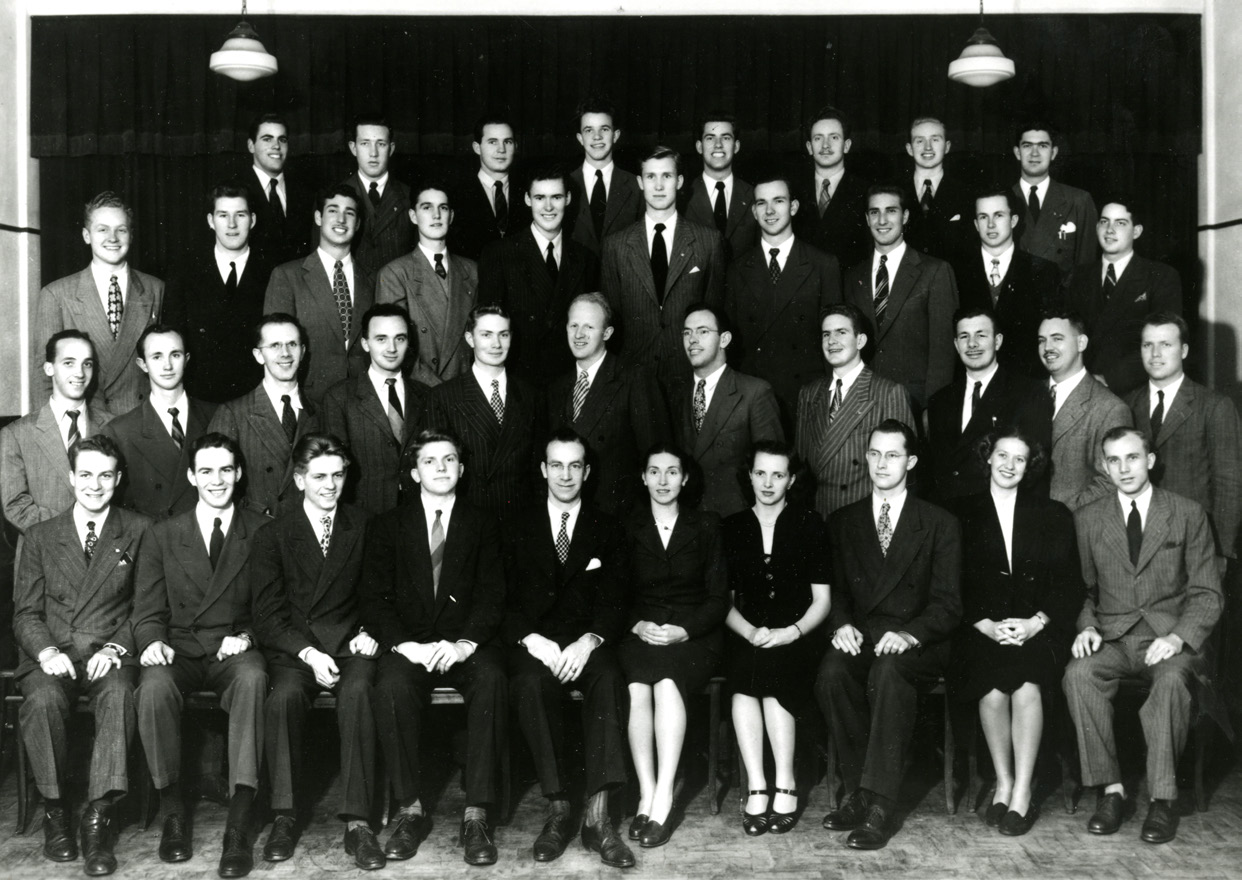 Missionaries in Brazil, with the mission presidency and their wives seated in the front row. Courtesy of CHL.
Missionaries in Brazil, with the mission presidency and their wives seated in the front row. Courtesy of CHL.
Missionary Activity Report Forms and Uses: Visiting Investigators is included in tracting time provided no special trip has been made to visit the investigator. Missionaries should not do unnecessary things which take up the time that should be used in the spreading of the gospel.
Projection Machines: Should know their condition and whereabouts. They can be used very effectively in getting cottage meetings started.
What the Missionary Does in His Day Off: Generally a missionary meeting in the morning followed by athletics or other things as, cleaning up quarters, clothes, shoes. Afternoon—Such things as, laundry, a show, visit friends, or study.
Delivery of Mail: Do Missionaries receive their mail regularly? Is there a waste of time by them going to the post office to receive it. Arrange system whereby no time is lost in receiving mail. Recommended that missionaries do not receive packages from the states through the post office because of the time wasted and the duties paid.
Notes:
Make better use of time. Time is precious.
Missionaries need direction.
Mission President to be relieved of some duties by counselors in order that he may work more closely with the missionaries.
Closing Prayer: Elder Stephen L. Richards
Irene M. Richards Letter[15]
HOTEL SAO PAULO
Sao Paulo, Brazil
March 10, 1948
Dear Georgia:[16]
Your letters have been informing and lovely. I did not have orchids dripping from my shoulder, but I had gardenias. Everyone has been most gracious and overwhelmed us with flowers and gifts. . . .
I am glad you all write and take care of one another as you do. And you certainly have kept us posted. Sorry spring left so soon in Toledo. The weather here is good. Ideal late summer and fall like. Pleasant days and cool evenings. . . . I like to read the signs and I find it more difficult to make them out than I did the Spanish ones in the other two countries.[17]
. . . The people have such poor roads they have jumped from ox teams to the airplane. We are going to travel a bit tomorrow and see just how rough the roads are. We have seen six oxen plowing and an airplane above. The prairie schooners have wheels about 8 or 10 feet high to negotiate the mud in rainy weather. Everyone lives in the city and has a new car. From our window all the cars have pointed hoods. If someone should set up a “hot shop” on these streets they would make a fortune. There are no drive-ins and ice cream or hot dog places.
Irene M. Richards Journal[18]
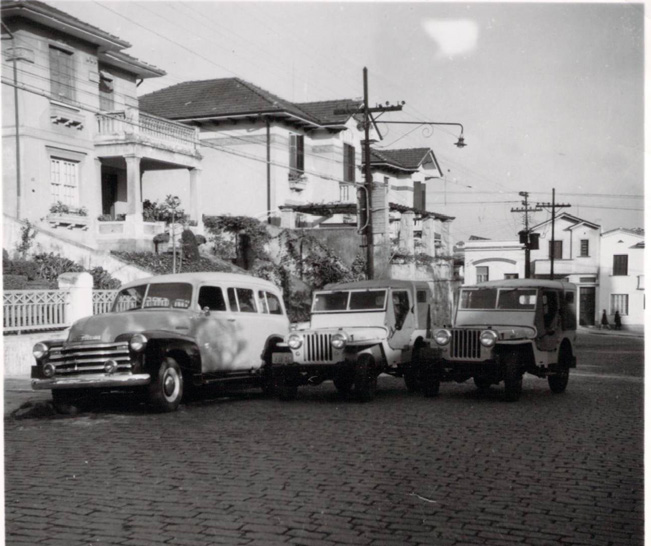 Vehicles used by the Brazilian mission. Courtesy of Church History Library.
Vehicles used by the Brazilian mission. Courtesy of Church History Library.
Mar. 10—1948. We rode to Campinus,[19] a beautiful place. We are in a nice hotel.
Campinus.—Alfrado [Vaz] rode with us to the conference.[20] The country side is up and down, green and flowery. The road is red mud. We made it over every hill. Our Hotel is extra fine. A new building in the midst of tile roofs which have grown brown with dead moss. It rained in the night. We rushed to close the windows. The dinning room is modern and lovely. The green and gold ball was held here in a grand room. There are many nationalities about. We ate with Bro and Sister Rex.
Update from Argentina: W. Ernest Young to Stephen L Richards[21]
March 10, 1948.
Elder Stephen L. Richards
Sao Paulo, Brasil.
Dear Brother and Sister Richards:
We have taken the liberty to take out your letter and re-mail it, since it came by slow mail and in a rather heavy envelope. May we say, also, that we just received a nice letter from your nephew, Lee Richards, from Rosario. He states that he is following, strictly, the advice of the Doctor, and that he is feeling much better. With the reassigning of Elders at our general conference, we shall do our best to give him a new place to labor.
Many Elders and saints send their appreciation and gratitude for your visit with us. We, also, thank you for your wise and kindly help for our betterment in our labors. Our weekly reports have returned to us filled out as per your instructions.
[not clear, ink stained]◊◊◊◊◊◊◊◊◊◊◊er B◊◊◊◊◊r ◊nd [and] I ◊◊◊◊◊◊◊◊◊◊ng the papers, and have agencies looking for a home in the Belgrano district of the city, but to date we have not been successful.
Wishing you every success and a happy visit in Brazil, we remain,
Respectfully,
THE MISSION PRESIDENCY
/
Per W. Ernest Young
P.S. Please give our best wishes to President and Sister Rex.
PIRACICABA AND RIBEIRÃO PRETO, BRAZIL
Friday, March 12, 1948
Daily Summary
Visit to Piracicaba and conference and missionary meeting in Ribeirão Preto
Irene M. Richards Journal[22]
Mar. 12
Piracicaba—We met two elders in a nice local. This [is] a beautiful place, tropical. Crossed river Campenis, red with silt, but the banks are green.
Zubu cow from India. There are many in the fields white and colored. The jungle is thick and orchids are growing among the trees. We could see the plants but its’ not in season or else they grow thicker back in the jungle. Beautiful flowering trees, pink, yellow and purple abound. Poinsettias are all along and oleanders and many bright bushes grow among the mass.
At an intersection in the <road was a>[23] drinking fountain made in Rock, to accommodate travelers. The roads are built by digging down below the bumps and that makes a smooth surface with banks on each side, there by digging a drain ditch it makes those everlasting Lanes with rows of lemon grass growing. (planted there on about 2 feet-high soil on either side. Uniform all the way). No shoes are worn by most people, so they can wash the mud off before entering houses. Many carry bundles of sticks or reads for firewood or other uses. I guess the early priests, before roads were as good as now built brick and tile shelters so often for travelers to rest in. For miles one can see sugar cane plantations. When they reap it is like in Louisiana by cutting a wide swath straight through the field first oxen 4 span with wood or any kind of a load. The oxen are mostly white and are called Yabu [Zebu] oxen from India. Bamboo is grown all along which is cut for use and piled in rows. Some to build huts, some smaller pieces for stakes.
Mar 12—1948. Fri
We held a public meeting at a Gomez (famous musician) hall. Alfrado [Vaz] interprated for Stephen very well. After we held a meeting for the missionaries
Elder Grant C. Tucker’s Journal[24]
At 6: P.M. Apostle Richards and President Rex and wives with Alfredo [Vaz] arrived and then at 7:30 we held our Conferance and it was a fair turn out to the Conferance we had between 60 and 70 persons attend the meeting. Afterwards we held a missionary meeting which was very inspiriancial inspirational. the Ones who spoke in the Conferance were Alfredo, myself, President Rex and Elder Stephen L. Richards. We got to bed at 12 or after.
CAMPINAS, BRAZIL
Saturday, March 13, 1948
Daily Summary
Baptismal service held outside of Campinas and missionary and member conference
Elder Frederick H. Dellenbach Missionary Journal[25]
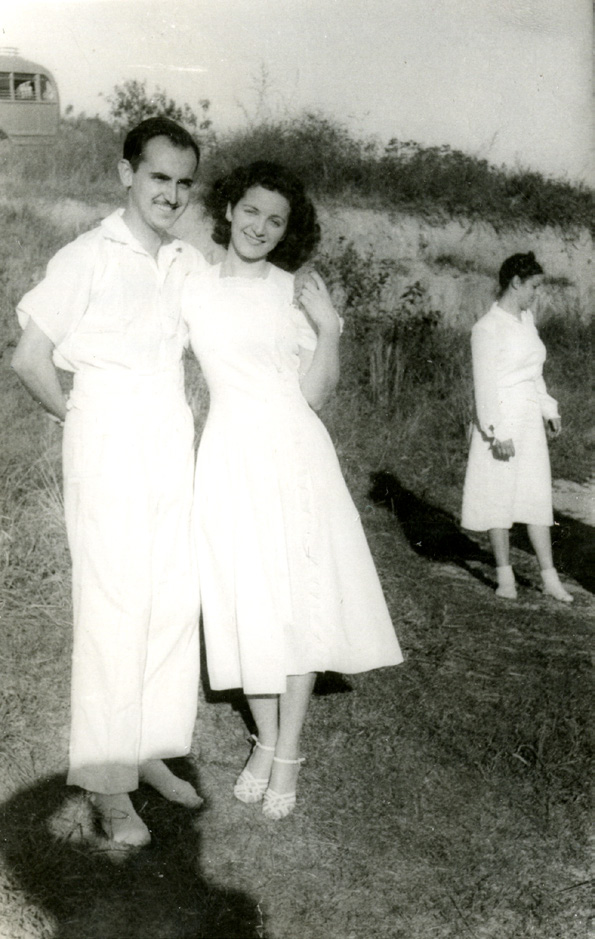 Alfredo Vaz with Clarisse Marotta at her baptism, July 1947. They later married. Courtesy of CHL.
Alfredo Vaz with Clarisse Marotta at her baptism, July 1947. They later married. Courtesy of CHL.
Dull, gloomy, clouds look like rain. Thats the outlook we had when we woke up. . . . Ate and went home to get ready for the baptism. We met at the church and took onibuses to Sousa St was a ride of about ½ hour over dirt roads that had been turned into mud. It was sprinkling as we held a meeting in the open p[r]ior to the baptism. We sang a song had prayer and then Apostle Richards dedicated some remarks to the candidates for baptism. He said that they were taking the first step toward gaining glory in the Celestial Kingdom and returning to the presence of their Father. He also stated that he hoped that the families of these young people could see the happiness that they knew and join with them. The river water was moving fast because of the rain. The baptisms came off without an accident. Maria Augusta cried with joy after she came out of the water. Her father met her, and embraced her. That service must have left a deep impression on his mind. We sang going back on the bus. The missionaries sang some American numbers that the brazilians liked.
[Entry from March 15, 1948, about the baptism]
In writing on Saturday’s baptism I forgot an important thing that happened. After the baptisms were over it stopped raining and the clouds parted in a hole directly above us. This was a manifestation to us that the ordinance found favor with God.
Elder Frederick H. Dellenbach Missionary Journal[26]
We went home changed clothes and hurried to the conference. It was held in the Terminus Hotel which is one of the most modern buildings in Campinas. It has a beautiful hall and they there were 120 people there. Elder Alfredo [Vaz] spoke and Elder Beck and an Elder Maxwell from Hollywood sang solos and a duet “The Morning breaks.” Apostle Richards address the audience and told them he came as another missionary in their midst. He spoke on education and how it frees us from fear because of ignorance. I cannot write what he said but the audience enjoyed it. After the meeting the elders sang “Come, Come ye Saints” as the girls of the branch presented Sister Richards with flowers and a huge spray of 22 orchids.
Irene M. Richards Journal[27]
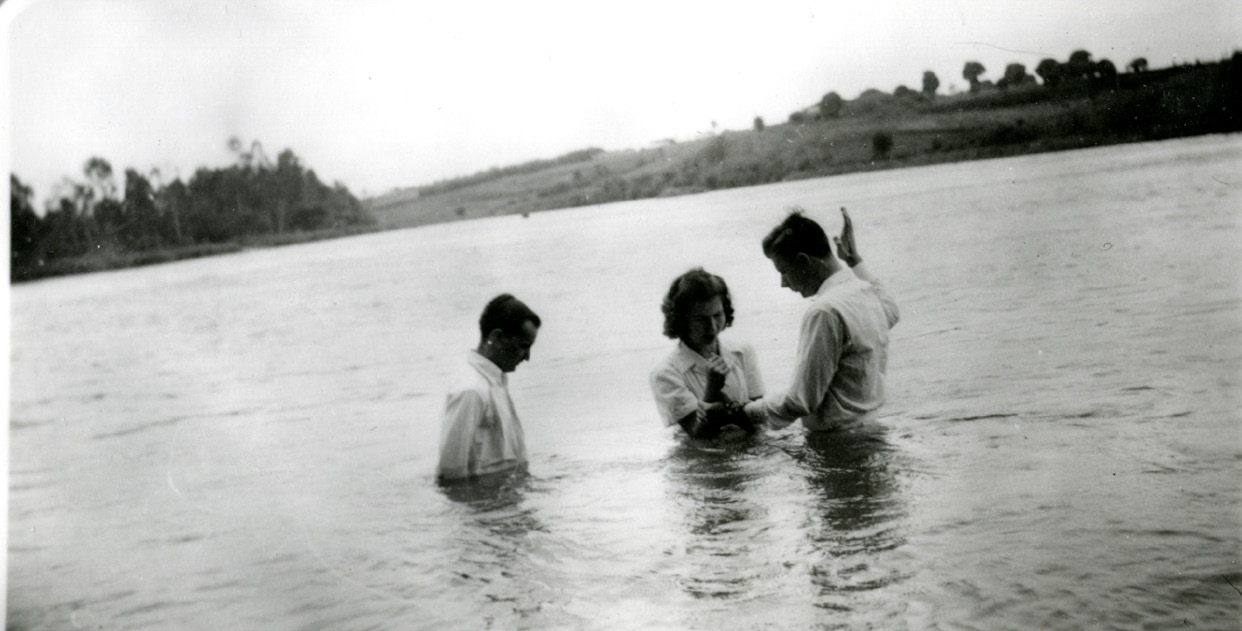 Jessie McMulley baptism, 1947. Alfredo Vaz was the witness. Courtesy of CHL.
Jessie McMulley baptism, 1947. Alfredo Vaz was the witness. Courtesy of CHL.
Mar 13th 1948 Saturday.
We stopped to investigate the coffee plants. Green bushes, about 12 to 20 feet high. Small green leaves, and branches covered with green berries, which later turn red, brown and black. It looks like (Pyracanthus) and is dried, shelled and browned, bagged, ground, etc. “There’s an awful lot of coffee in Brazil.”
Bro Beck worked for Charles is here on a second mission. He is a councellor to Pres Rex. His wife is a girl from Malad, a lively girl. They are tending the Rex baby while we are on this trip together.[28] They say to Call Charles. They hope to be home in September
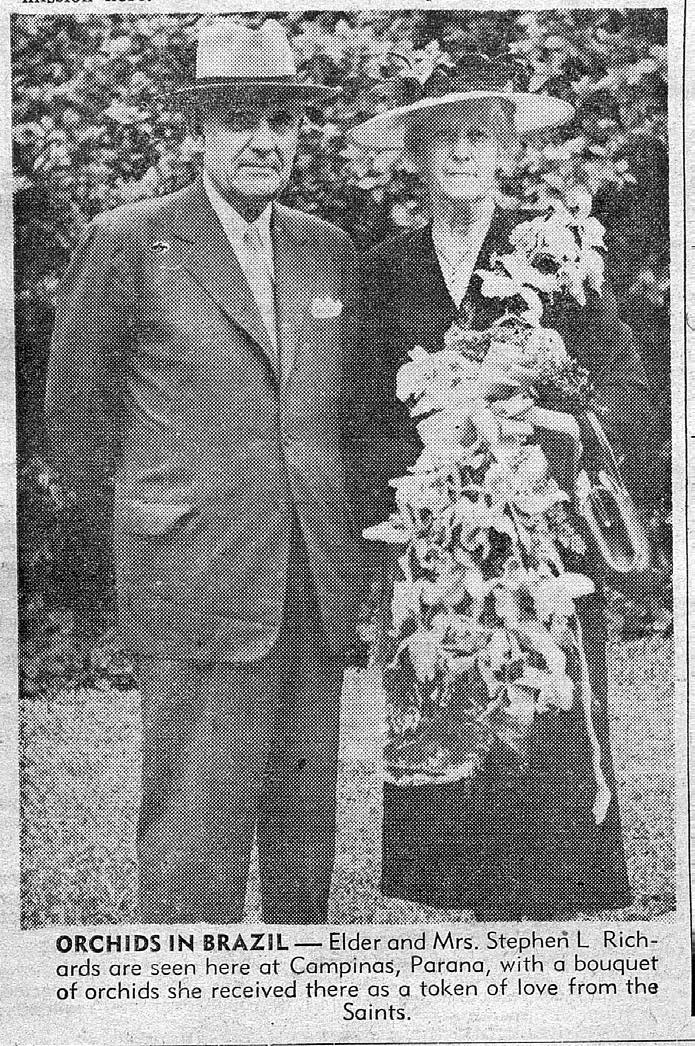 The Richardses receive orchids in
The Richardses receive orchids in
Campinas from members. Courtesy of CHL.
Stephen attended Rotary and met some more men of note. He took Pres. Rex this time.
We attended meeting in the hotel dinning room. There were 171 present. Bro Maxwell sang. also Bro Beck sang, and Stephen spoke well. Afraido [Alfredo Vaz] interpreted and the branch, relief and Mutual and elders, presented me with 2 dozen orchids, in one bunch. Never before was any gift so beautiful. Then there were roses, asters and chrysanthums. Really we were overwhelmed. And tired enough to sleep in a nice room.
. . . Yesterday we witnessed 7 baptisms at the banks of a red river. It rained and still there were about 50 present. Quite a thrilling sight. The father and mother were not members but they were willing their daughter should be baptized. After At Rotary the father told Stephen he was going home early to spend a few hours with his family, because it was being broken up, their daughter was joining the Mormons. After the service he came to Stephen and said he was sincerely happy. So I guess he will be O.K. now.
News Article: Unidentified Newspaper[29]
Campinas Is Host to One of the Most Eminent Figures of the Contemporary Religious World
Apostle Stephen L. Richards will speak at a Conference Tomorrow in the Hotel Terminus.
Campinas is host, since yesterday, of one of the greatest figures of the present religious world.
Coming from the United States, Apostle Stephen L. Richards, together with his esteemed wife, has already traveled through several countries of our continent, leaving where ever he has been an impression that will never be forgotten, for such is the beauty and spiritual power of his words. In Argentina, where his church has a large number of members, the newspapers did not spare the eulogies, and there was one that called him “True minister from Heaven.” Apostle Stephen L. Richards is one of the twelve apostles of the Church of Jesus Christ of Latter-day Saints, (Mormon) besides being a practicing lawyer of long standing. He is visiting Brazil now to come in contact with the Brazilians and officially visit the Mission of his church in our country, one of its newest fields of labor.
Campinas is one of the very few cities of the interior where he will speak, thus, tomorrow at 8 P.M. the Salon of Hotel Terminus will be opened to the public which certainly will flow there to hear this, his first and only conference in our city. We invite the general public and especially those who are interested and know how to appreciate the beautiful things of the world to come to the above mentioned address to hear the profound and authoritative word of this illustrious visitor.
News Article: Unidentified Newspaper[30]
A Representative of The Church of Latter-day Saints in Campinas
Apostle Stephen Harold [L.] Richards spoke in the Hotel Terminus Yesterday.
Under the direction of Mr. Harold Rex, President of the Brazilian Mission of The Church of Jesus Christ of Latter-day Saints, a solemn service of that church was held yesterday in the Salon of the Hotel Terminus, to pay homage to Apostle Stephen—Richards who is visiting Campinas. Mr. Richards, who resides in Salt Lake City, Utah is traveling throughout all of South America with the object of coming into direct contact with the Mormon communities of the continent.
The meeting, which was very well attended, began with the song “The Battle Hymn of the Republic” followed by a prayer of thanks by Mr. Remo Roselli, Counselor of the Campinas Branch. Following, a homage was paid to Mrs. Richards which consisted of a rich bouquet of orchids delivered by Miss Maria Augusta de Almeida.
M. Alfredo Lima Vaz, President of the Campinas Branch gave a welcoming speech to the visiting Apostle, making a dissertation of the Church. Following were musical and vocal numbers given my Messers Maxwell and Wayne Beck, respectively from the Piracicaba and Campinas Branches.
As the principal part of the meeting program, Mr. Richards gave a discourse in English, of high religious and social sentiment. His words, upon immediate translation by Mr. Alfredo Lima Vaz caused a profound impression upon the audience.
At the end of the meeting all of the organizations associated with the Campinas Branch paid homage to the Richards by giving various bouquets of natural flowers.
The meeting ended with the singing of the hymn “God be With You Till We Meet Again” after which all the missionaries sang the traditional hymn of the Mormons.
Sister Evelyn Beck Letter[31]
Campinas, S.P.
March 15, 1948
Dear Mother, Dad and All:
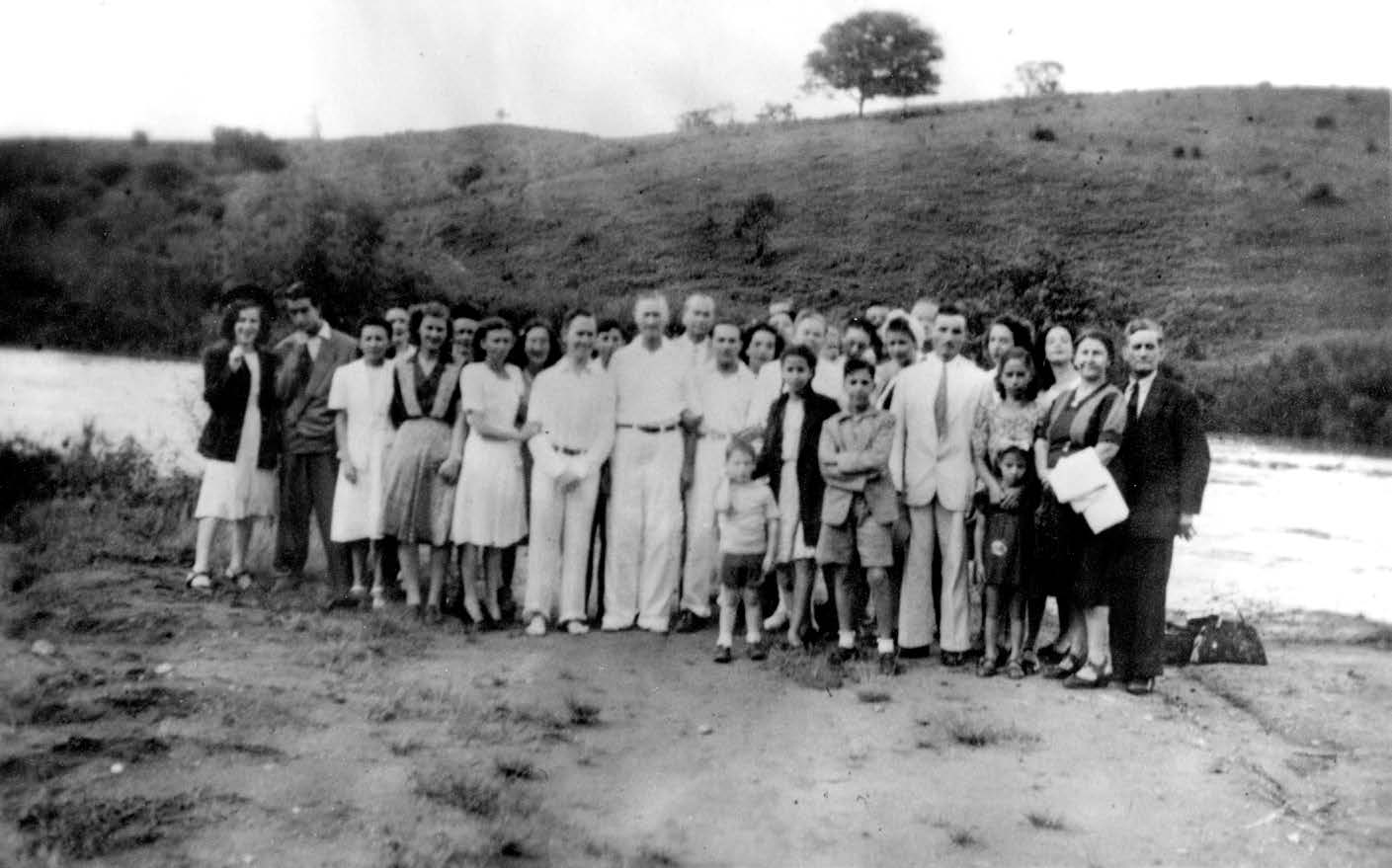 Baptism in Campinas, São Paulo, Brazil. Courtesy of CHL.
Baptism in Campinas, São Paulo, Brazil. Courtesy of CHL.
. . . Apostle and Sister Richards have been out here. They came Thursday afternoon [March 11] and stayed here in the hotel that night. Then Friday morning [March 12] early they left for Ribeirao Preto with President and Sister Rex in the new Studebaker. They had a conference there that night and returned here Saturday [March 13] before noon in time for Brother Richards to attend the Rotary Luncheon. At 4:00 P.M. we all went to Souzas where the baptisms took place. It started to rain Thursday—no Wednesday and hasn’t stopped yet. Well we thought the baptisms would be postponed, but when Wayne and President went up to the Church about three o’clock, seventy people were waiting for the two chartered busses that they had arranged for earlier in the week. So Wayne went on the bus and the kids and I went with President and Sister Rex and Apostle and Sister Richards. There were five candidates. Elder Lewis baptized two, Wayne two and Elder Walker one. These people go through with their plans here in Campinas rain or shine.[32] I’ve never seen their equal. Brother Richards was very impressed with the baptisms. They held a short service before on the river bank and he talked a few moments while someone held an umbrella over his head.
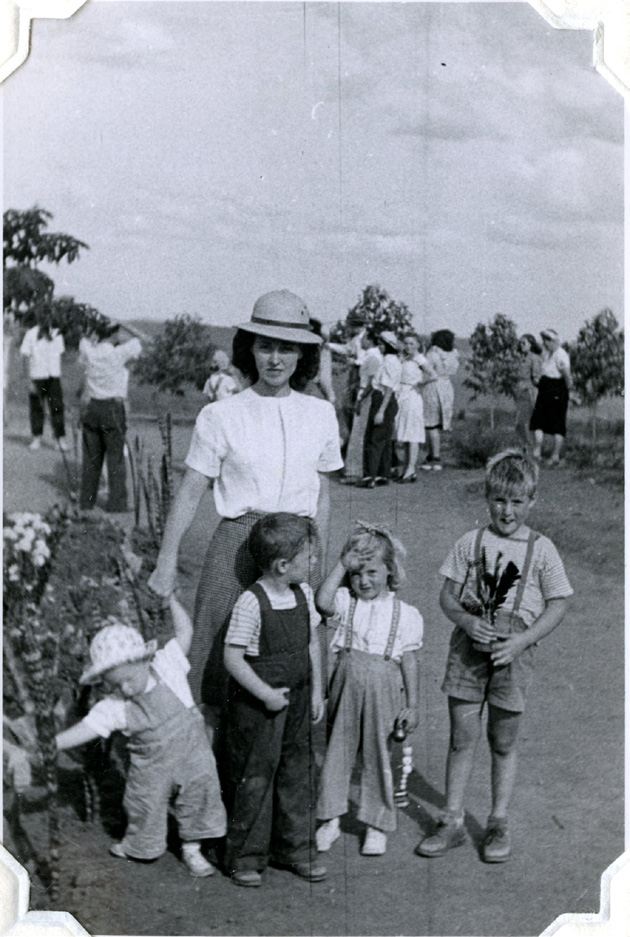 Sister Diania Rex and her children. Courtesy of CHL.
Sister Diania Rex and her children. Courtesy of CHL.
That evening he invited Wayne and me to have dinner with them and the Rex’s at the Hotel. We did and thoroughly enjoyed it as the food was delicious. That’s the first time we’ve done that since we’ve been in Campinas. So it was quite a treat. At 8:00 our conference started. It was beautiful. Wayne sang a solo and a duet with another fellow and Alfredo, Elder Claudio, President Rex and Brother Richards spoke. Alfredo translated for Brother Richards. There were 170 people there. By the way, it was held in the Terminus Hotel, the same hotel and room where we had our Gold and Green Ball. The Branch gave Sister Richards a bouquet of two dozen orchids. The arrangement was more like a lei that went around her neck and down to the floor. She was so thrilled. She said she had only had two orchids in her life and one was when she left to come down here. They wanted to have her picture taken with them. Besides the orchids, the Relief Society gave a bouquet, Priesthood, Mutual and Sunday School. So she received five bouquets of flowers out here. She is Charles Merrill’s sister, Wayne’s boss. Brother Richards said he’d never visited a Branch here in South America with a better spirit than we have here. He acted so pleased with everything. Then Sunday morning [March 14] at 7:00 we had a missionary meeting. It also was beautiful and of course we all cried. Brother Richards told Wayne after the meeting, “Elder Beck, you’re doing a marvelous job. I congratulate you.” They left for Sao Paulo at 9:30 that morning and had conference there that afternoon. This morning [Monday, March 15] they left for Curitiba and Joinville and will go to Rio to catch the boat which leaves March 24th. Every one of the members was happy to see him and he was so kind to all of them. They won’t be able to tour the entire mission here in Brazil which is bad because all the members have looked forward to his visit for so long.
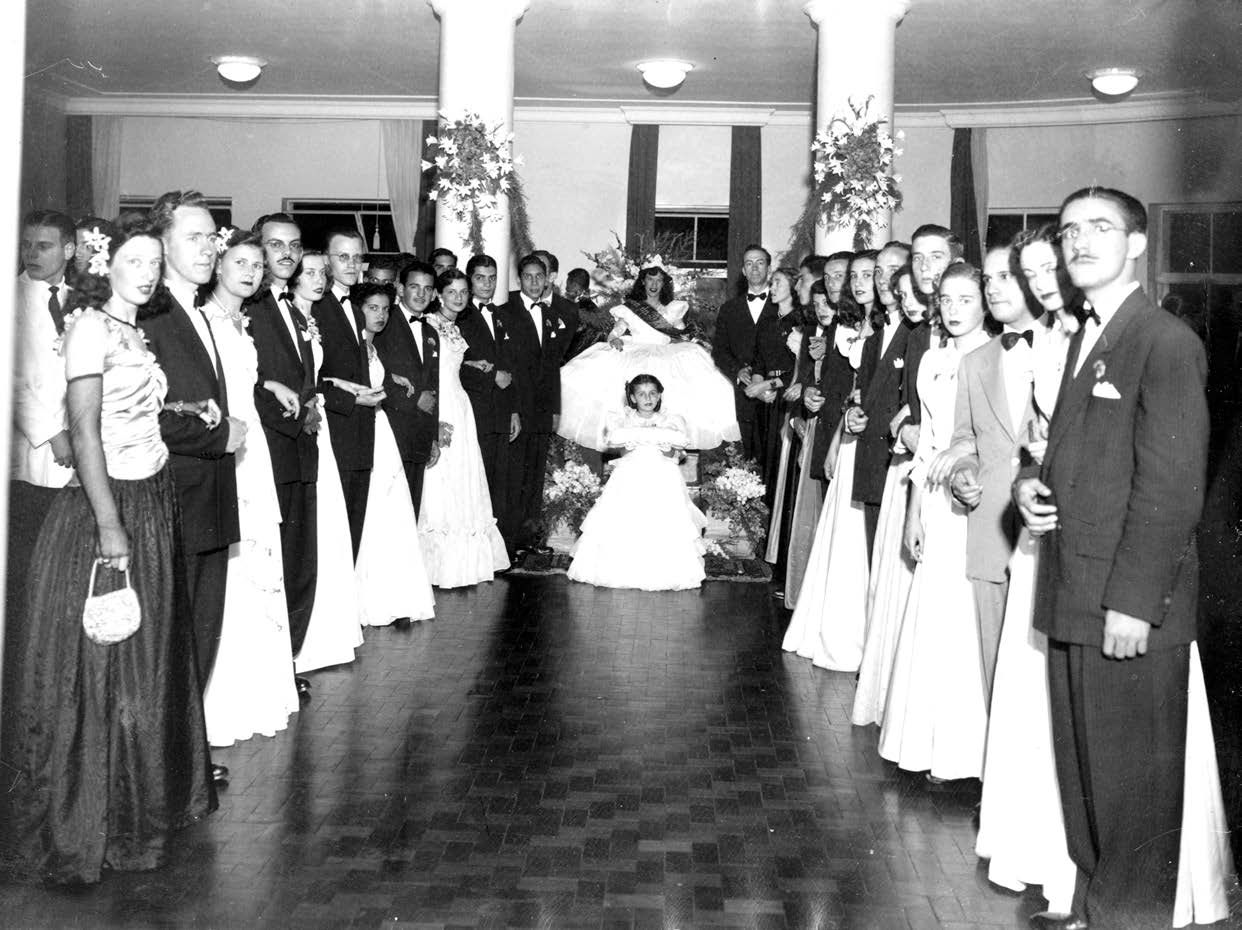 Gold and Green Ball held in Campinas, August 27, 1948. Courtesy of CHL.
Gold and Green Ball held in Campinas, August 27, 1948. Courtesy of CHL.
CAMPINAS AND SÃO PAULO, BRAZIL
Sunday, March 14, 1948
Daily Summary
Meetings in Campinas and São Paulo, summary of trip to Brazil so far, and brief general history of the Church in Brazil
Elder Frederick H. Dellenbach Journal[33]
Were up at 500. Went back to sleep. Wake up ½ hr. before we were supposed to be in meeting. We held a missionary report meeting at 7:00 AM with Apostle Richards. We all arose, gave our names, wards and from what stake and then told of our work, our problems, our ideas for improvement and then bore our testimonies. We felt the Spirit of God in our midst and my voice cracked and there were tears in my eyes as I bore my testimony. It [is] a wonderful experience to fell [feel] that Spirit and humbleness which I felt then. Elder Beck and his wife broke down too. Apostle Richards commended the work in Campinas and promised us many blessings if we would look unto the Lord. Apostle Richards left with President Rex for São Paulo to attend the conference there.
Irene M. Richards Journal[34]
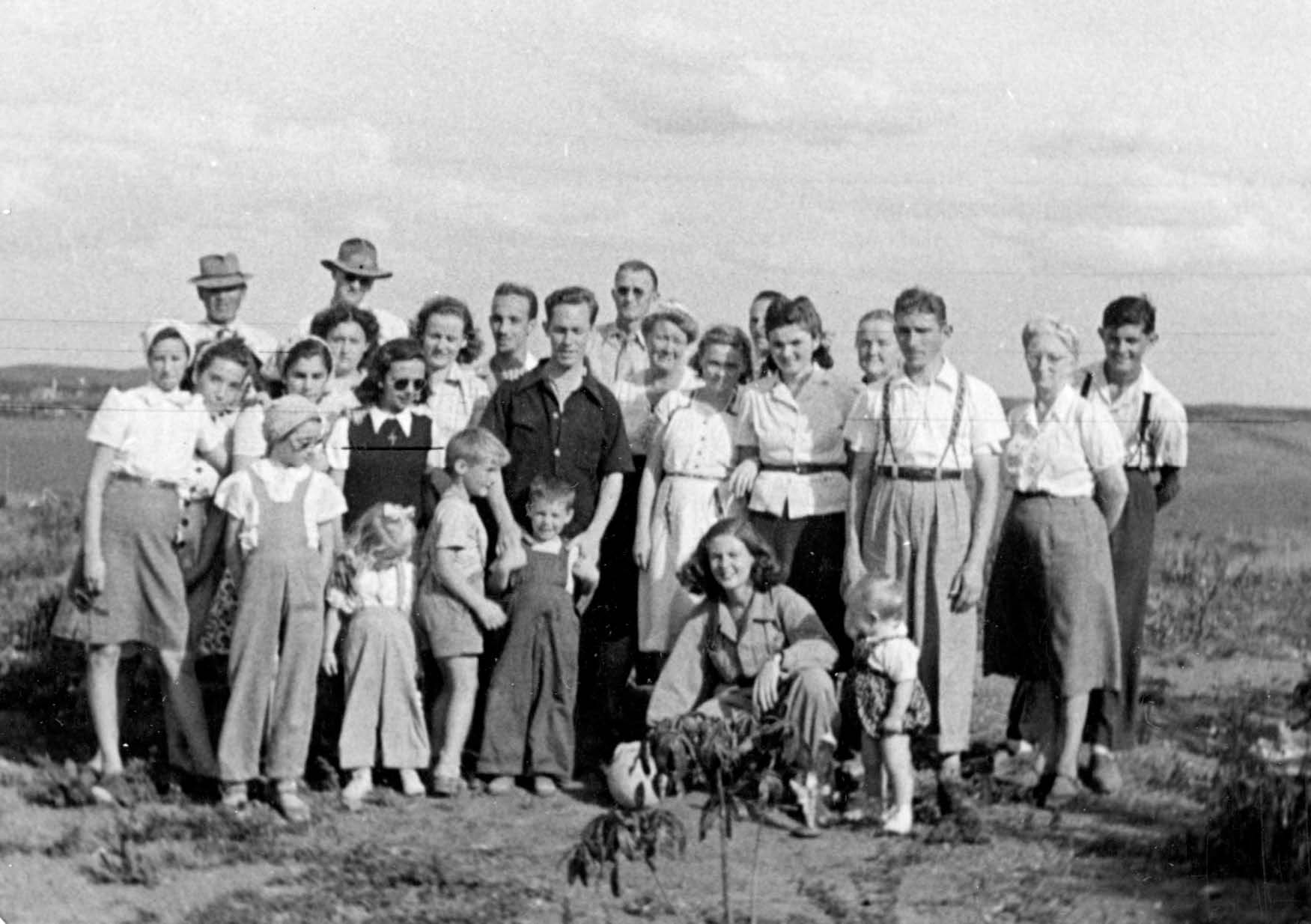 São Paulo Branch picnic, 1946. Courtesy of CHL.
São Paulo Branch picnic, 1946. Courtesy of CHL.
We returned about noon and attended a German meeting. They didn’t seem too happy. They are refugees who came to Brazil their transportation paid if they would work out in the fields for a certain many years, then they’d be free. By now they are more Portuguise than German and their children are growing up to be real Brazilians. Some old ones speak German yet. Some underwent many embarrassing things but their lives were saved and their children will have a home. One lady gave me a bunch of zinnias.
Then we held a Portuguesi meeting. The elders sang. . . . Stephen spoke well interpreted. ◊◊◊◊oth. The saints presented us with orchids and a beautiful tray. One with butteries[35]—“CZarboleta” in blue and yellow and brown. I was so hoarse when we finished our thank you’s that I just fell into bed.
News Article: Church News[36]
Elder Richards Ends Trip with Tour of Brazilian Mission
By Elder John A. Alius
SAO PAULO—Leaving behind them a wake of inspiration and friendship, Elder Stephen L Richards of the Council of the Twelve, and Mrs. Richards have completed about half of their tour of the Brazilian Mission.
As the first apostle to visit this mission since its organization as such in May of 1935, Elder Richards’ stay in Brazil is attracting much attention and in each of the branches visited so far, halls were filled to capacity. Considerable press attention was also accorded his advent here.
Apostle Richards and his wife are in Brazil on the last lap of their review of the South American Missions of the Church. Before arriving here, they had visited the Argentine and Uruguayan missions.
In their travels around the mission Elder and Mrs. Richards were accompanied by President Harold M. Rex and his wife, Diania Rex.
So far, Elder Richards is favorably impressed with this country, especially with its progressive young people, and the beautiful architecture and landscaping of the larger cities.
The tenor of his speeches in the branches visited so far has been one voiced by the general authorities in all nations: The need for faith and repentance, and of living close to God.
He told some hundred people who attended the conference held in Sao Paulo under the most adverse weather conditions, that God will be our best friend if we will but become His friend and this we accomplish by accepting and living His teachings, and going to Him in prayer.
One of the outstanding meetings held to date was in the industrial city of Campinas, a model town of the state of Sao Paulo. There, more than 170 persons attended, although the Church membership numbers only 50. At Campinas, Elder and Mrs. Richards witnessed also the baptism of five persons on the banks of a beautiful little river a few miles from the city.
In another town in the same state, Riberao Preto, where four missionaries have been laboring for only a few months, and where there are no members of the Church, whatever, 65 persons came to hear the inspired words of Elder Richards.
While Elder Richards is here to present a message of encouragement and hope to the people of Brazil, his main reason for visiting this country is to review existing conditions as applied to missionary labors present and future. His report will be presented to the First Presidency and Council of the Twelve upon his return to Salt Lake City.
While his review of conditions here is the first visit of one of the Twelve in the Brazilian Mission, Apostle Melvin Ballard had been to this country in 1925, when the east coast of South America was dedicated as a field of missionary labor. At that time, the South American Mission was established, with Brazil figuring only as a district. Missionaries started their labors, with headquarters in Jolnville [Joinville], Santa Catarina, in 1927.[37]
In 1935 the Brazilian district became a mission in its own right, with Elder Rulon S. Howells as first president.
At that time, as in the years since the work was first started here, and until 1939, the teachings of the Lord were preached here in the German language exclusively, on the theory that people of northern and central European extraction were more receptive to the Gospel.
In the first years of World War II, however, the Brazilian government passed a law prohibiting the use of language other than Portuguese, and the mission suffered a set-back from which it is only now recovering.
Evidence of the knotty matter was the necessity, in some branches, of Elder Richards’ speeches being translated into two tongues: Portuguese for those persons converted since 1939: German—it now being permitted again on a limited scale—for those who had accepted the Gospel in the time when the work was carried on in that language.
Many German members and investigators in this country, having gone through their lives associating with people who were almost without exception, of their own race, have never learned the tongue of this country.
The complete withdrawal of the missionaries for almost three years during the war, leaving the ◊[m]ission with a lack of qualified leadership in the priesthood as well as other phases of the work, struck another hard blow, which is only now being healed, with the coming of more and more missionaries.
There are, at the moment, 56 missionaries laboring in this mission. All of them, as well as the mission’s 450 members—little less than half of whom are now of non-German extraction—feel that the visit of Elder and Sister Richards, and their observations and suggestions made here, and to the authorities at home, will see the work of the Lord progressing in this nation at an unprecedented tempo.
TRAVEL TO CURITIBA, BRAZIL
Monday, March 15, 1948
Daily Summary
Traveled 300 miles to Curitiba
Irene M. Richards Journal[38]
March 15th 16- 1948—Tuesday Monday
It’s wonderful how one can get up the next morning.
We started early, without breakfast which was wrong for Steve. He must yet learn that he can’t start out a trip before 8 and still be served breakfast in S..A. Well, we traveled in the rain and red mud for 500 K.M. which is about 300 miles I guess, through a hand made highway, cut thru hills with picks and made with donkeys and carts, by Brazilians, I imagine very many years ago. There are some 100 feet cuts and it winds continually up and reaches about 300 K.L. in altitude. Then we wound down in the same way until we reached a pretty valley and came to where 6 elders were housed in a new local. “Coritiva” is in the States of Paraná◊[39] in Brazil. The road is wide—enough for passing, and the nativis keep it up beautifully. They rake it and keep the gutters in repair. When we pass them they turn their umbrellas to keep the splash from their clothes. We saw one woman washing in a wheelbarrow by a trickle of a stream. The idea is to soap the clothes and spread them
Curitiva, State of Paranae[40]
out in the sun, which does the work, they rinse them after and dry them again which makes them white. which is impossible because of the red water they use. All along are huts where dirty unfed children sit or peer out, and I never saw so much human pack animals ever. The women carry babies, and bundles, and sticks. The donkeys carry baskets of stuff tied on each side and every man has a burden of some sort. We saw one gurrnie [guinea] hen, then we saw a man with a rifle, so it won’t be there long. The roads are so bumpy that no auto attempts them. The only other one we saw was one we lent our jack to just before we arrived here. Many trucks and some jeepes. The rail road comes in a dusty way from a great way a sound distance taking two days, which is more sensible than an auto in one day. The plane doesn’t land here, but comes to “point Elegro” [Porto Alegre] and “joinvilla” [Joinville] in about 3 hours from Sao Paulo. People here know that if you cannot use the plane you had better stay at home, because you can’t travel if you don’t. Business men do just that, but we are strangers and didn’t know. So we are literally “all in.” I am afraid Bro Rex new car won’t have the resale value he hoped it would have after we are gone. I notice there are a few autos in town but they are not covered with red mud. The rich people use them around town.
There never was such a lovely canvice [◊◊◊◊◊◊◊] place. The mountains are covered with a jungle growth. Some fine trees and finally on the highest point were the “Paranáe” pines—a tall flat-topped spreading pine tree like an umbrella. We have seen these peculiar trees no where else. The profusion of pink, yellow, and purple blossoming trees are lovely among the very green other foliage. One fellow had caught a snake and it was squirming and striking but he seemed to enjoy its antics, and knew how to control it. We were exhausted and didn’t want to dress for dinner, so they sent us up something we said light—like “bread butter milk fruit.” When it came it was two heavy meals including wieners steak and fish, so we laughed at the idea of people too tired to eat. “Oh, for a clean kitchen and two eggs and some butter and toast and cold arden milk.”
JOINVILLE, BRAZIL
Tuesday, March 16, 1948
Daily Summary
Heart problems in Curitiba, travel to Joinville, and conference in Joinville
Irene M. Richards Journal[41]
This morning Steve’s pulse was 41. We dosed him up and it came to 48. Then it went down again. At about 10 it seemed fair. But we decided to go on and have him ride sit in front [of the car]. So as the people say “With God willing” we trusted a lot.—
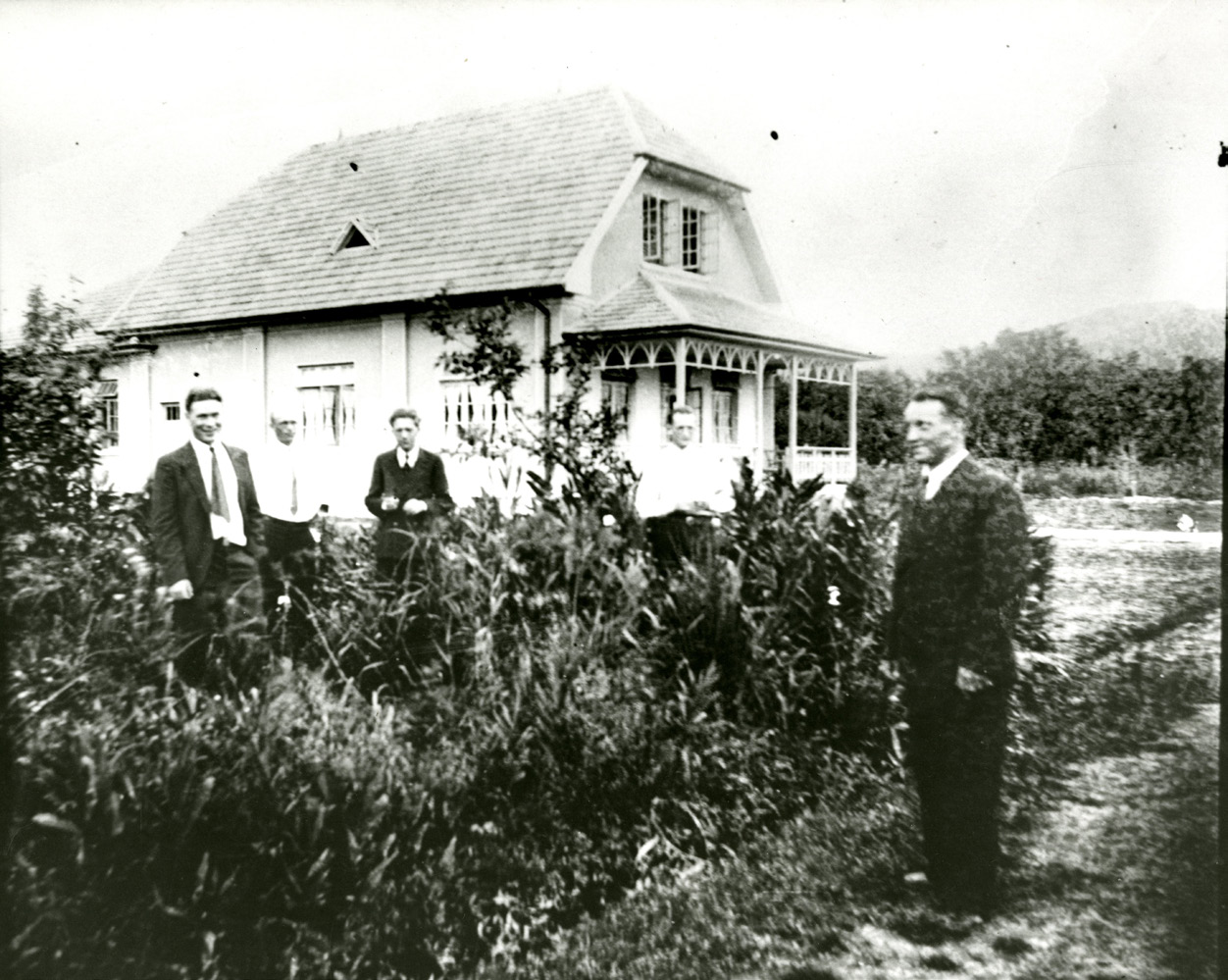 Joinville Branch meetinghouse, 1930s. Courtesy of CHL.
Joinville Branch meetinghouse, 1930s. Courtesy of CHL.
The ride was marvelous. Such scenery and such awful roads. I am sure the front seat was better and we are here and he is still 60–58. There is a German here and his hotel is clean. I think that makes Stephen feel better. The filth of some places kills him. The road thru a canyon wound as did the one yesterday but it was extra beautiful. Some waterfalls and streams and high hills, and distant views were marvelous. I am glad he felt better so we could all enjoy it. The missionaries are coming to dinner together before meeting. This German “Joinvilla” is refreshing and not Spanish. No high walls, no dark corners. We are eating dinning out under the trees in a garden. Bro Rex took us around the town in his auto. There are some people here who won’t join our church because the elders got in bad a while ago, and being Germans they can’t forgive. This may have been the place where the S.A. mission began under a “Stohl” and started with a very poor class, and they can’t raise the standard yet.[42]
News Article: A Noticia[43]
Religious Movement
Two Missionaries of The Church of Jesus Christ of Latter-day Saints Visit “A Noticia”
We had the pleasure yesterday of receiving two young men “Elders,” Kent Tyler and Elmo Turner, missionaries of The Church of Jesus Christ of Latter-day Saints, who informed us of the arrival Saturday, the 16th of Mr. Stephen L. Richards, who is presented as one of the twelve apostles of that Church. The two missionaries explained to us that their church is based upon the organization of the primitive church the which, as their adepts believe, was lost until the year 1830, the year of the organization of their church. They further explained to us that they are two of nearly 5000 missionaries spreading the gospel to all parts of the world.
Mr. Richards is journeying here accompanied by his wife and also by Mr. Harold M. Rex, president of the Brazilian Mission and his wife. Mr. Richards will stay in Joinville only one day where he will deliver a discourse in the Church of Jesus Christ situated on Rua Frederico Hubner; the discourse will be translated into Portuguese and German.
Mr. Richards and his wife are making a journey of inspection of the South American Missions of the Church already having visited Argentina and Uruguay. Their plans include holding conferences in Joinville, Curitiba, Santos, São Paulo, Campinas, Priacicaba [Piracicaba], Sorocaba, Ribeirão Preto, Belo Horizonte, Juiz de Fora and Rio de Janeiro. Upon terminating this excursion, they will return to Salt Lake City in the state of Utah, USA which is the Center of the church. There in one of the General Conferences of the church Mr. Richards will make a report of his inspection describing the conditions and problems here encountered and offering counsel for their adequate solution in the interest of their church.
The young missionaries whose visit we appreciate invite the public to meet with them in their meeting Tuesday at 7:30, the entrance being free.
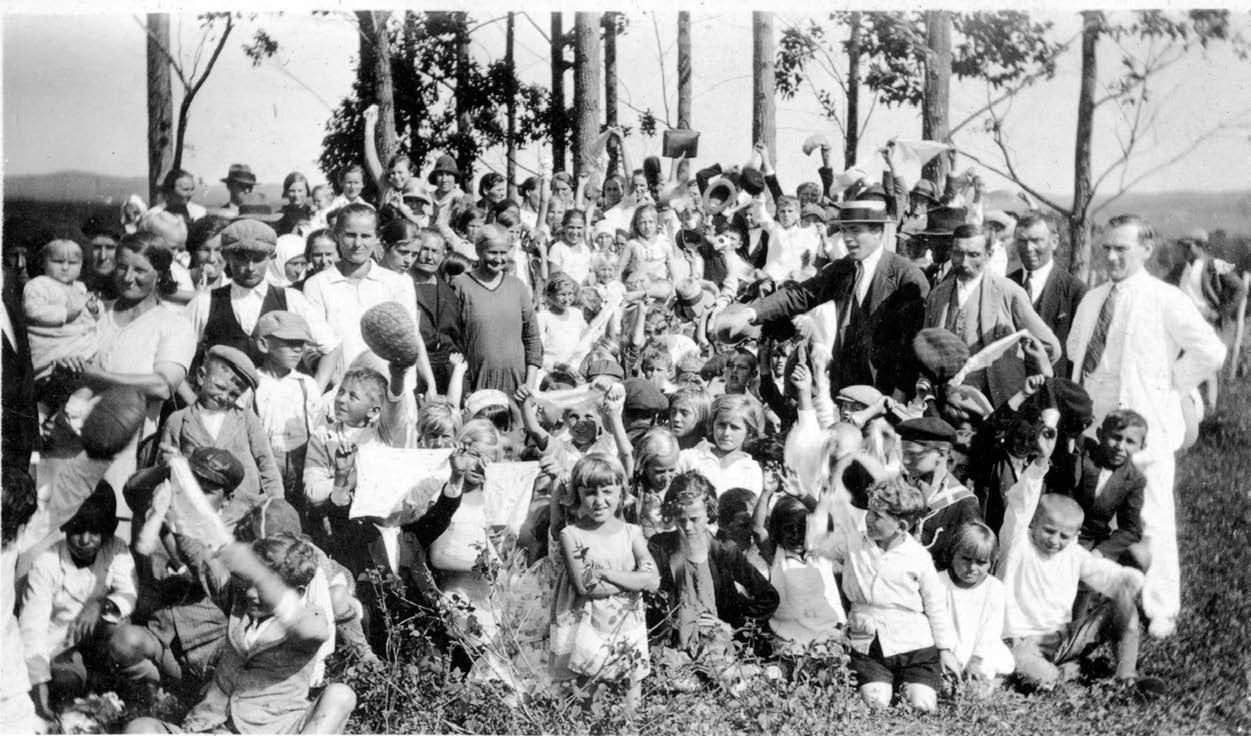
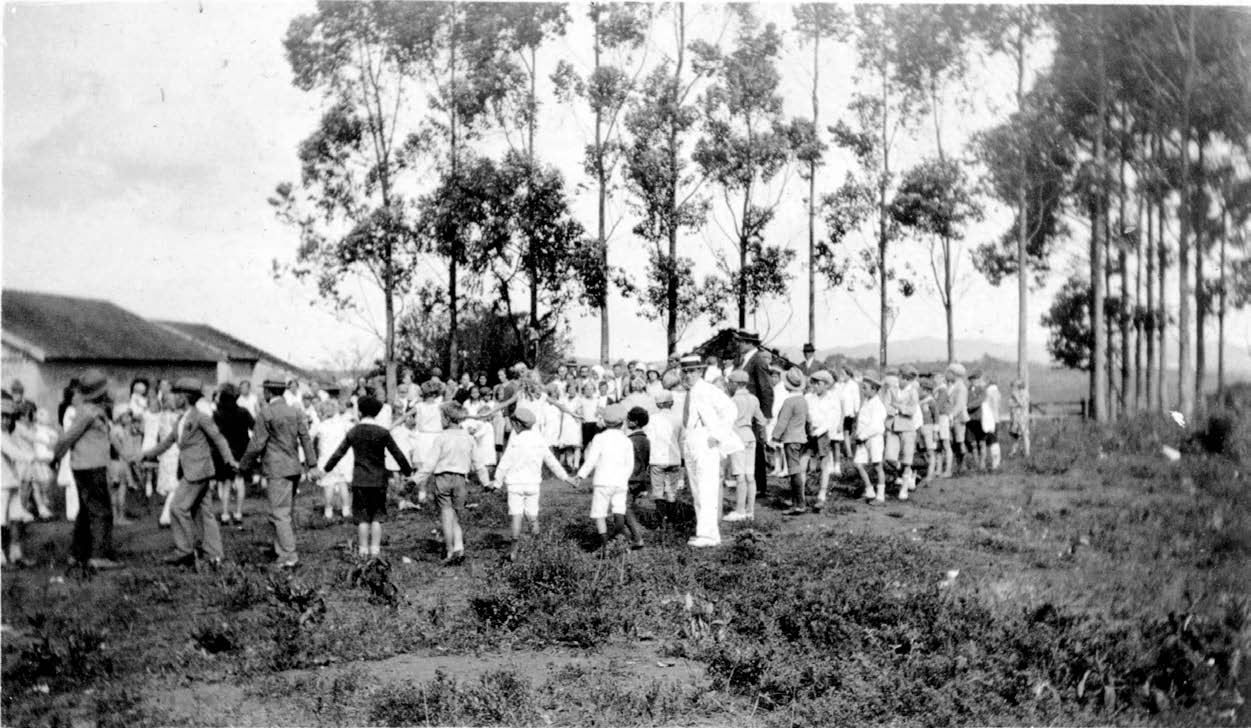 Joinville Branch Primary activity, 1937. Courtesy of CHL.
Joinville Branch Primary activity, 1937. Courtesy of CHL.
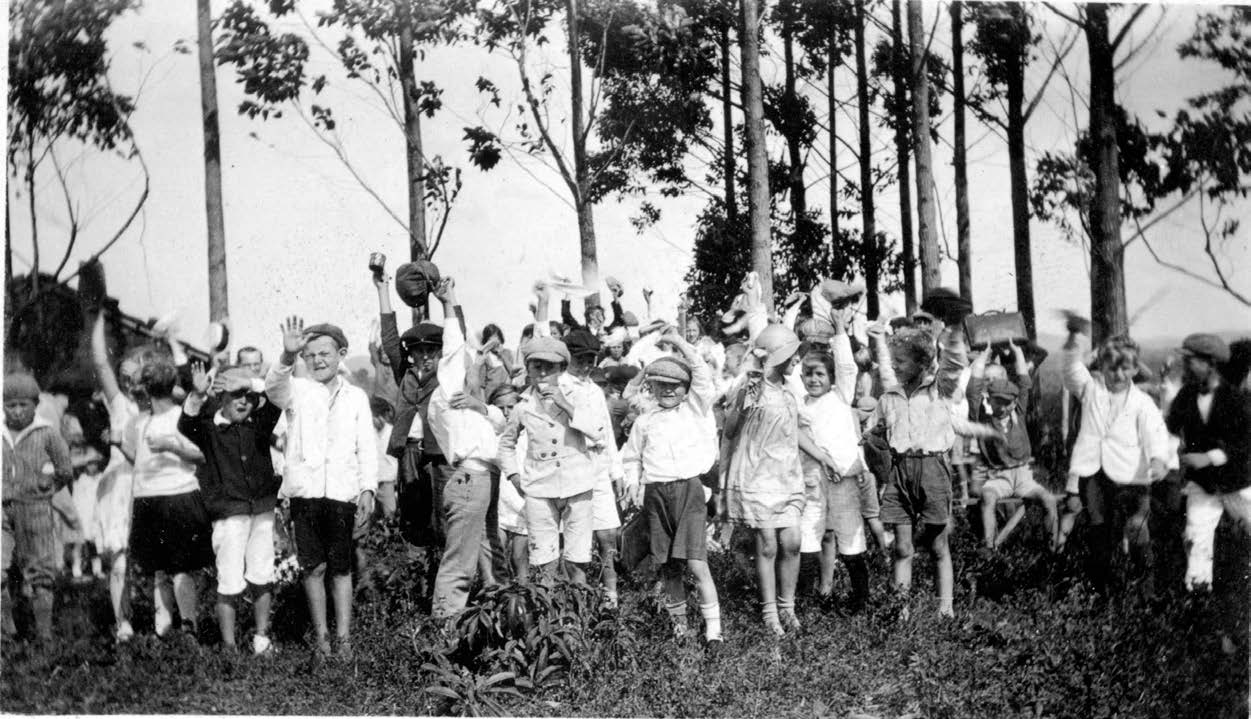
Brazilian Mission Record[44]
Brother Stephen L. Richards, of the Council of Twelve, and his wife arrived in Joinville today about 2:30 P.M. with President Harold M. Rex and wife. They came in the mission’s new Studebaker. Brother and Sister Richards rested in the afternoon at Hotel Trocadero. They are both elderly and have endured a very strenuous journey through Argentina, into Chile,[45] back through Uruguay, and now Brazil, and as a result are tired and worn. However, the rest did them much good and they seemed to recuperate marvelously. The missionaries ate dinner with them and President and Sister Rex. Then at 7:30 P.M., the Joinvile District Conference commenced with Brother Richards presiding and Elder C. Elmo Turner conducting. The conference has been well announced both through the newspaper and on the radio and there were 127 present, 85 of whom were friends, and filled the church to capacity, leaving some standing in the back.
President Rex was the first speaker and then Brother Richards spoke. He was inspired to say many beautiful and enlightening things about the gospel and bore a strong testimony to the divinity of Jesus Christ and the restoration of His church in these latter days through the Prophet Joseph Smith. The main theme of his talk was on brotherly love and kindness. He was inspired to stress especially the need of being a true friend and refusing to believe tales about anyone until such things are proven. There is a great deal of “Quatch”, or underhand stories circulating about the different members and this talk was exactly the thing needed.
It was a beautiful conference with many, many beautiful flowers about the rostrum and new, heavy dark red curtains lending a certain dignity that was noticeable. Elder Turner translated the talk into Portuguese. Pres. Rex translated Brother Richard’s greeting to the members in German.
Irene M. Richards Letter[46]
We have traveled about 100 miles west and south, since I began writing. At one town the saints presented me with 2 dozen orchids. So Georgia, I was dripping with them from my shoulder down to the floor. I was so taken off my feet and thrilled. So now I have had all that’s coming to me. Everyone is disappointed because I don’t speak but they would be more so if I did. We have traveled thru the most primitive country possible. Thru a mountain pass, cut by hand. . . . It was too rough, but we made it, and it was too much for Papa. He is O.K. now. We won’t come back the same way. No one travels in Brasil by auto or train, just by airplane. The roads are impassable; we found that out. The scenery was magnificent. The falls, mountains, streams, jungle and distant views. I am glad we saw it, but we will try anything once. I have no other definite word about our coming home as yet. We came back by air. It was fun. Now I will want to do all my traveling by plane. There is no word other than that I wrote. So we will either see you in N.Y. or at Toledo. You decide which. We are fine and will spend three days in Rio and embark on the Argentina on the 24th, see N.Y. on the 5th of April.
Lovingly,
Mother.
CURITIBA, BRAZIL
Wednesday, March 17, 1948
Daily Summary
Travel back to Curitiba and meeting and conference in Curitiba
Irene M. Richards Journal[47]
We rode back from Joinvilla a German town, to Corativa [Curitiba].[48]
Last night the meeting was a full one but peculiarly cool. The people don’t feel so well toward Americans for fighting Germany, and it is shone in their faces and demenior. There was some good music, but the elders said two men left because the girl sang in German instead of Portuguise, which shows they are a problem.
It had rained which made the roads more passable. Stephen rode in front and I am sure he stood it better. The waterfalls and distant scenery are beautiful, and no one saw a more true discription of a jumgle [jungle]. The boys came in the jeep and followed us in.
We have rested, aten [eaten] and are now ready for the meeting with the elders at one. It is Allies and Phils’ birthday and I have been thinking of them among the South American cenery◊ [scenery] There are 20 men here. . . .
At the meeting in a public hall the table was strewn with gardenias. Stephen kept us for an hour after the elders were finished and gave the usual good advice. All the boys were pleased. This is the last meeting of elders. Tomorrow we are taking the plane maybe.
Brazilian Mission Record[49]
About 6:30 A. M. Elders Turner, Tyler, Wilson and Stringham left for Curitiba in the jeep. They were met on the road by Brother Richards, Pres. Rex, and their wives in the Studebaker and the jeep followed it to Curitiba, arriving there at 10:00. Twenty missionaries from the Ipomeia, Curitiba, Joinville, and Porto Alegre[50] Districts met there and attended an inspirational meeting from 1 to 6 P.M. in the Curitiba branch hall. Brother Richards gave us all some very good advice and we all reported to him our activities and our needs, etc. giving him a better over-all picture so that he may return and report more completely the conditions and needs of this mission when he returns to Salt Lake City. At 8:00 P.M. in a rented hall, the Curitiba District Conference was convened and again Brother Richards gave a forceful discourse that thrilled all listeners. Elder Turner again translated the talk into Portuguese. The missionaries stayed at a hotel and the following morning, March 18, they departed to their various fields of labor. The four brethren, Elders Turner, Tyler, Wilson and Stringham returned to Joinville the same day, having made a safe, enjoyable and very worthwhile trip.
Elder Milton R. Bloomquist Missionary Letter[51]
Saturday afternoon 3 pm, 27 March 1948
Dearest Folks,
. . . Well, there isn’t too much news from down here, but there have been a few things. As for one, our supposed conference with Apostle Stephan L. Richards here in Novo Hamburgo. We didn’t have it! Elder Richards is 70 years old,[52] and after he and his wife had made their visits through Argentina, Paraguay, Chile,[53] and Ury◊guia [Uruguay], they were very, very weary; but at that that they visited all but 4 branches here in Brazil! As you can perhaps picture though, we were pretty disappointed down here when we received news to cancel our conferences and just the missionaries go up to Curitiba to hold a missionary conference. The saints took it very hard and could hard[l]y be reconciled.
All 6 of us Pôrto Alegre district missionaries left here 13 March a Friday morning at 6 a.m. [T]wo of us, Elders Bowles and Sellers (my companion), had to take all their bagage and believe me, that train ride would have been pretty rough on them alone if there hadn’t been four others of us to help them carry their stuff and change from one train to another you know, the trains down here are a lot different from those in the U.S.A., however, these here must resemble the 1860 models nearly 100 years ago there! It is like every thing else down here—Atraz da lua—or as translated means ‘behind the moon’. We are still in the cart and oxen era down here—in fact we seem to be just coming into that! I will have to show you some pictures I have been taking after I get back.
We had a nice trip up to Curitiba and back. It took us 3 days <and two nights> going up and 3 days and 2 nights coming back to Pôrto Alegre also. It was a trip that afforded us some excellent scenery to view—more than on[e] ordinarily sees from a train. It gave me an oppertunity to see some of Brazil’s thick interior and the odd hillbillyish people who live there.
Apostle Richards gave us a fine address, advising us of all the darkness of the political world at this time and our need of having the branches as self supporting as possible with as many local brethren presiding in branch affairs as possible should we missionaries have to leave for causes of war or any such thing. He also explained to us the shortness of our missions and the big job which rests upon us as ambassadors for the church here in Brazil, then he impressed us with the need of organization and diligence to make the most of our time. No one knows any better than do I just how fast this mission time can fly by. 9 months have passed since I left Salt Lake City in June, it seems impossible to me—how does it seem to you?
We had only one day of conference in Curitiba and it wasn’t a full day. From 1 PM to 6 PM Wednesday, 17 March we 20 South Brazilian missionaries met in our meeting with Brother Richards & wife and also President & Sister Rex. Then at 8 PM until 9:30 PM we missionaries attended the Curitiba branch conference and after that we held a business meeting at the missionaries apartment home for an hour discussing mission problems and receiving and giving helps and advise one from another. The day ended at 11:30 PM, and at 7:30 AM Thursday we were aboard the train to begin our long, s[l]ow, dirty ride back home.
CURITIBA TO SÃO PAULO, BRAZIL, VIA AIRPLANE
Thursday, March 18, 1948
Daily Summary
Returned to São Paulo by airplane
Irene M. Richards Journal[54]
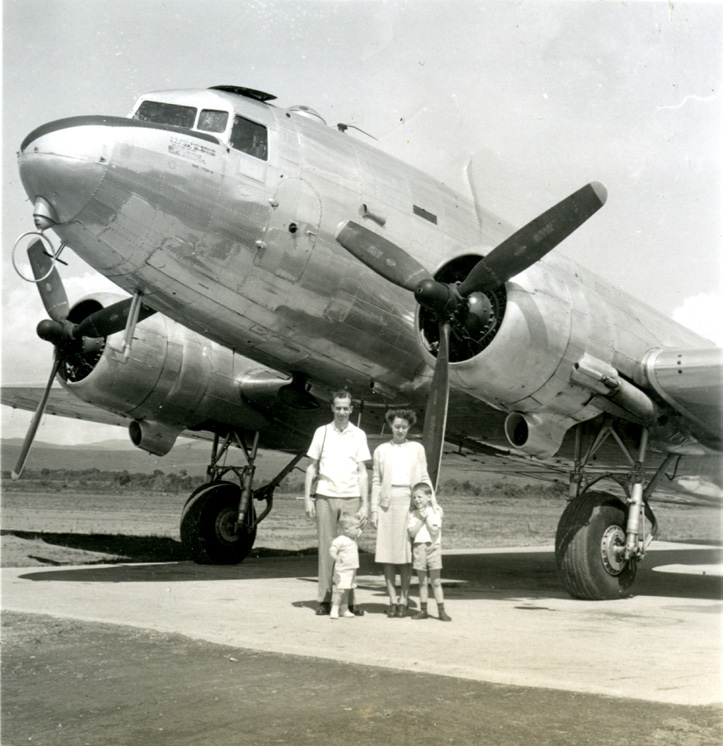 The Rex family standing in front of a DC-3 airplane. The Richardses’ first flight was on a DC-3 airplane in brazil. Courtesy of CHL.
The Rex family standing in front of a DC-3 airplane. The Richardses’ first flight was on a DC-3 airplane in brazil. Courtesy of CHL.
The Rexes have just driven away, for Sao Paulo. We are going to miss their company and the beautiful drive thru the hills but we will try the plane. Stephen will try anything once. Bro Jenson came and took us for a taxi ride about 25 K.M. from the city to the airport. He brought us a beautiful tray from the elders and saints of Parana. It’s beautif<ul> with wood inlay, and is a fine rembrance of the country. They are very generous I’m sure.
The air trip was glorious—no trouble and very smooth. The view over fields and villages hills and jungles was interesting and the clouds were so light and snowy. I am surely grateful for such an opertunity. We flew it in 1 and ½ hours. Our ears ached while coming down. We landed well and felt fine From Curitiba to Sao Paulo. The taxi brought us back to Hotel Sao Paulo, and we feel at home. From our window we see the same scene we saw at [room numbers] 907 and also 1507 and now we are 807. They are nice suites of rooms. I have entirely worn out my pen and am using Stephens, which doesn’t seem so good either. We walked a little for which I suffered cramps in my feet.
SÃO PAULO, BRAZIL
Friday, March 19, 1948
Daily Summary
Mission presidency meeting
Irene M. Richards Journal[55]
Pres Rex, Elders Beck and the other <Bro Neilson> [Nielsen] are coming here for a meeting this morning. I am going to write some letters.
I wrote to Lynn[,] Allie, Georgia, Philip and Richard, Ellen and Sister Young.
After dinner the elders resumed their discussions here. Pres Rex brought us some pictures of orchids and oxen and baptisms and “Yara.”[56] Instead of taking the train we are going to “Fly down to Rio”[57] sunday a.m.◊
Brazilian Mission Presidency Meeting[58]
Minutes of Mission Presidency Meeting
March 19, 1948
Presided over by Elder Stephen L. Richards
Prayer Elder Wayne M. Beck
Chief among the factors that Brother Richards believed was necessary for the improvement of this mission was the adoption of a plan which would give greater stimulation to the missionaries. The best supervision is in their progress. We must live with them, stay with them, help them and show them.
Second to this factor was that we get a new start in Sao Paulo. We can get the lower class to come up to the higher level, but we cannot get the higher class to go down to the lower level. We must work for self-sustaining groups of Latter-Day Saints.
Following the above two factors the housing conditions and factors involved were to be considered next.
In view of these factors Brother Richards recommended the following three measures be taken here:
- Arrangement of a program which would create a more effective system of stimulation of the Missionaries and their work.
- Establishment of a program which would give a more promising outlook in Sao Paulo.
- Housing, factors and conditions.
- Brother Richards suggested:
- A division of the mission in so far as supervising of the missionaries is concerned. Elder Wayne M. Beck to move to Curitiba and supervise, under the direction of President Harold M. Rex, the activities of the missionaries. He should work, tract, assist in Cottage meetings and show them how to do and also to improve their methods on teaching of the Gospel. In general stimulating them onward to a better performance.
- President Rex would assume nearly the same role in respect to the missionaries of the northern half of the mission. Working with them more closely and stimulating the missionaries and their efforts. In addition a division of this type would reduce the travel time normally taken by the Mission President and therefore allow more time for him to devote to the supervision of the mission as a whole.
- Elder Thayle Nielsen[59] would remain in Sao Paulo and supervise the operation of the mission office and other duties as suggested by the Mission President.
How much time should be given by missionaries to out of the way places deserves our careful consideration. Likewise, work that does not contribute directly to the proclamation of the gospel. A study should be made of the problem of cutting down time on housekeeping duties and allow more time to the teaching of the gospel. This is an administrative problem and would require close and frequent supervision.
It is wrong to lead missionaries to believe that they may become District Presidents. Policy of the Church is to visit missionaries oftener than every 6 months. We must be careful not to scatter the missionaries out too thin. Missionaries should show a breakdown of other expenses in their weekly reports.
- Establishment of a program which would give a more promising outlook in Sao Paulo.
It would be well if we had a new beginning here in Sao Paulo. The higher class people are reluctant to visit meeting places in a lower class district. It was recommended that we obtain a place of meeting in a higher class district and begin to tract and do other missionary work in that area. Other missionaries would continue to carry on in the old sections.
- Housing, factors and conditions.
The first objective in the selection of a mission home is to obtain a suitable place for the executive offices of the Church. Second is locating in a good residential district. Third—a good living place for the Mission President and his family.
Much discussion was given to the selection of a mission home in an excellent residential district. Brother Richards visited some fine homes in excellent districts here.
It was urged that we investigate carefully and thoroughly all zoning restrictions before we recommend a purchase. Matters such as costs and upkeep, tax exemption, and transportation facilities would require our very careful consideration.
Other Subjects Discussed.
Branch in Ipomeia,[60] State of Santa Catarina. We must work to the end of making that branch self-sustaining. The amount of time spent there by missionaries is to be carefully considered.
Basketball Team and Chorus. A great deal of consideration was given to the many factors involved. Have we the necessary talent, musically and athletically? Is the time used in this manner going to give better results than a more direct means of proclamation of the gospel?
Visas. Letter given to Brother Richards prior to his departure.
Closing Prayer—Elder Stephen L. Richards
SÃO PAULO, BRAZIL
Saturday, March 20, 1948
Daily Summary
Sister Richards remembers traveling conditions and discusses various ventures in São Paulo
Irene M. Richards Letter[61]
HOTEL SAO PAULO
Sao Paulo, Brazil
March 20, 1948
Dear Allie:[62]
On your birthday[63] we were riding through a dense jungle on a narrow road cut by the hand of man with only rude implements and with the help of a donkey and cart, and mostly not even a donkey. . . . This single lane is cut for about 350 miles, then there is a big town. Then we traveled 150 more to another big town. People seem content to live in these, and they don’t travel. Those who are rich go by airplane, and trucks carry food thru the road, which no auto can use and last long. We only met a few autos and we were willing to take the judgment of the Brazilian business men, who say they all do their traveling by plane, after we tried it once and so we returned on a big plane to Sao Paulo and enjoyed an hour and a little more of smooth, beautiful sailing above the clouds and were glad we were not bumping up and down on that one road cut thru hills and jungles, which we got glimpses of now and then. There were as many as six planes that landed and took off during the short time we were at the airport. So everyone who can’t afford to fly, just stays home. There is a railroad, mostly freight, which takes about two days to make the grades. So interior Brazil has a long way to go to become modern and very popular with outsiders.[64] They don’t care, they are happy.
I just spend my time writing while Papa does the work. It would have been fine for you to have heard some of his admonition, advice and informing talks to the Presidents, elders and saints. Those interpreting have done a good job, they say. I wouldn’t know. We have visited Spanish, German, and Portuguese for the most part. Question: Should one be intelligent to join the church, or should the church bring intelligence to people? I guess both, Some are illiterate and superstitious and need brightening up. Some have said they were disappointed that I didn’t speak. I think they would have been more so had I spoken. I think it’s hard enough to listen to a man talk, let alone a woman. We are finishing our last lap of our journey this week-end and will be on our way home again.
. . . Papa is holding a meeting while I write.
He finished his appointment and we rode out to see some locations for a new mission home. There are some beautiful mansions and some very lowly homes. I hope they choose a new upcoming district.
We have come across a waiter who speaks English and have succeeded in getting some pretty good things to eat so tonight we had a fillet split in half and done through and rice. Then a fruit salad for dessert. I guess they hate to see us come in the dining room, we are so hard to please and dumb to them.
We won’t be home until the middle of April just about, so as soon as school will let you, come over. We will have two months to be around before summer, and we could do a lot of visiting in two months. . . .
President Rex says the pullman train to Rio is not good, so we are going to fly. Then we can see the lay of the land and the water. “Flying down to Rio”[65] in technicolor, on Sunday morning. Then we have meeting and stay at the—I’ve forgotten the hotel’s name, but it’s a nice one, and then we play around Monday. Maybe Papa will have a cruise or something and we leave Tues. eve for home. I just can’t wait, although I have had such a fine trip.
Hope you are all well as we are.
Lovingly,
Mother and Father.
RIO de JANEIRO, BRAZIL
Sunday, March 21, 1948
Daily Summary
Flight to Rio de Janeiro
Irene M. Richards Journal[66]
We took the D.C. 3 at 7:30 a.m. We were the first ones to enter, and had our choice of seats. As we sailed over Sao Paulo we could see the town and then we got above the clouds, which lay like a white sheet over the earth, Once in a while could we see down through them onto the green fields and rolling hills. Sometimes roads would wind and end in some small town. Then we came over the ocean where beaches spread in and out and maybe some few inhabited spots, but mostly jungle. We did not ride high. My ears only popped once or twice. It was more smooth than car, or boat, and the steward was especially kind to show us maps, and explain things. Thank goodness he could speak a little Eng. He had been to Texas and Florida. All the personel are trained in the U.S. they say. We loosened our belts after we rose off the ground. Later we were served sandwiches, cracker and a drink. Brazilian coffee is a little cup of coffee, black, poured over sugar. So its like syrup of coffee. I took lemonade. Our plane skirted the land until we reached Rio, then circled the bay, and then over the apartment houses (which I am glad are not mowed down) then onto the airfield on the edge of the bay. We turned on 2 runways before we came to a stop. It was an unforgetable sight to see the Bay, below us was “Coconevade”[67] or the peak with the Christ on. The sugar loof where the cable <car> takes one for a view, and the entire city, beaches and whole picture in our grand panarama. This seems to be the crowning peak in all of South Am. travels, a thrills to be remembered all our lives. We suffered no discomforture, the landing was so easy. Sister Larson[68] was at the airport to meet us. I am afraid it was an imposition for her. We were only a few blocks from the Hotel Serrador, a new, beautiful round front building facing the park and beach.
From our 20th story window we can see over the town, hills beach and park. As we lay on our beds resting we can view, out of two immense windows, the scene. Surely there could be no prettier place in this world or the next. I must send my other five boys a card from our air trip.
RIO de JANEIRO, BRAZIL
Monday, March 22, 1948
Daily Summary
Missionary meeting and visit to embassy; last night in South America
Irene M. Richards Journal[69]
Last night after the Rex’s came we had a quick supper and went to a Brother Blazurs for a meeting. There were about 20 present. Sanders, Bird, people from home who are working here. There was a “camelian” <chameleon> on the wall, and when I looked again it was gone. I hope every one looked in their pockets because it hid someplace. We were tired and had a good room to rest in on the 20 floor but the big clock was lit up all night. [A drawing of a clock appears here in the actual journal entry.]
The elders are coming for a meeting and then we will have seen them all one [once], who is in the Mission. (Rex Fra◊◊◊ goes with address written below it.)
Mar. We stayed in the auto while Stephen called on the Enbasy [Embassy] until late. Then we went to dinner at Blazurs, the place we were at for meeting last night. We enjoyed an american meal and conversation. They are fine people. He was on a mission with Henry Richards in Germany.
The drive was thru two beach parks and at night they are also beautiful. Our last night in South America.
RIO de JANEIRO, BRAZIL
Tuesday, March 23, 1948
Daily Summary
Toured and shopped in Rio and boarded the SS Argentina bound for New York in the evening
Irene M. Richards Journal[70]
We are free to day and we hope we can go to the beach and have a cruise on the Bay. but there were no clubs for us. So we contented ourselves with just looking. There were many lovely boats. and there was to be a luncheon ◊◊◊◊ [soon]. We rode about and saw the gorgeous parks and places for the last time in Rio. We had a pear and an apple for lunch and rested. Then we walked thru on[e] of those autoless streets which was crowded with shoppers. The displays are fine but the goods are not so. There is nothing here of any merit much everything imported, lovely things from Eng[land] and Europe and some cheap things from America. We inquired for a Ballorena skirt and we had drove in Buenos Aires and Montevedeo and one place had one just from U.S. but it was not big enough for me. The women are so tiny. Their shoes are so cute also. Around one window was a crowd of ladies, trying to see the “new look.” It was near to a riot. I stepped back to save myself from being run over. The skirts are extra shirt [short] here yet. We ate dinner at the “Serrador” and the Larsons were with us. The man who played the music was an American and played beautifully. I enjoyed it all, and we visitid and said our goodbye’s. We rode to the docks with Larsons and the Rexes and they came on deck where we visited until midnight. Larsons had placed a big basket of roses on our dresser. Mrs. Rex gave me a journal and Sanders had left a couple of cocoanuts for us.
When we arrived at Rio, Rex and Larson were with us first and so we parted with our oldest friends in South America We enjoyed them much.
SS ARGENTINA, ATLANTIC OCEAN
Wednesday, March 24, to Monday, March 29, 1948
Daily Summary
SS Argentina leaves Brazil, the Richardses relax, and Elder Richards gives the Easter sermon; later in general conference Elder Richards shares a story about a minister he met on the boat
Irene M. Richards Journal[71]
[Thursday, March 25, 1948]
We are upon deck where it is cooler. The sea is calm and blue. Last night the moon rose where the sun had just set, full and big. I think it was a perfect evening in a tropical country, as far as I know. The guests preferred to dance on the deck and a very heavy man and woman took the prize in the Rumba or sumba or Tango, or whatever their nationality was. It was quite a demonstration. Billy says the Rhumba is Cuban but america has perfected it. The Tango is Rio or Brazilian, and the Somba is Uruguayan.
[Friday, March 26, 1948]
The wind blows constantly thank goodness, because it is so warm. We will soon cross the equator. The meals are excellent and the reading good. . . .
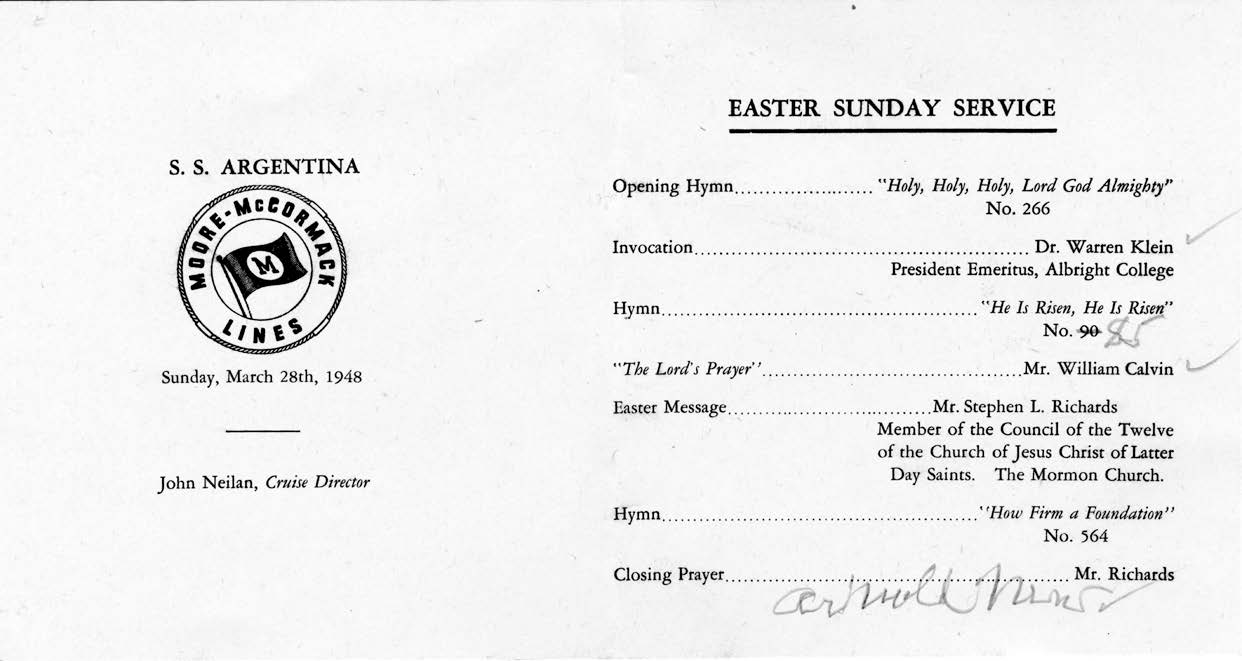 Elder Richards preached the sermon at the Easter Sunday service on the SS Argentina. Courtesy
Elder Richards preached the sermon at the Easter Sunday service on the SS Argentina. Courtesy
of CHL.
We came upon deck early and Stephen is playing shuffle board with a man named Richards. He has a son named Richard like we have. Mr. Hartnet is the manager who arranges for the service on Sunday. Stephen is to be the speaker. Easter services. We are waiting for the moon. We thought it was a ship on fire last night as it came out of the sea with a bang.
[Sunday, March 28, 1948]
Stephen gave the easter sermon, very big audiance, and several appreciations from people who had been to Salt Lake. “One lady I heard say. “I have never heard a mormon preach”. The music was good and some fine man prayed. We went down stairs to rest. Stephen got kind of excited and it made his heart miss. So we missed the easter parade on deck. They say there were about a dozen hatted ladies and one man with a baloon for a hat. It changes our lives when everyone knows you are a mormon. It makes one feel apart. I wonder what the children are doing at home. Who is rolling eggs on our lawn? etc. We did not wait for the moon tonight. We have crossed the equator some time today. We find many are complimentory about Stephens speech.
Stephen L. Richards Conference Address[72]
I am going to tell you of an incident which occurred on a ship while I was returning from a visit to South America a number of years ago. On this voyage, which included two Sundays, I was asked by those representing the captain of the vessel to conduct what were called “divine services.” There was no one on board of our own faith to whom I might appeal for assistance. I had made the acquaintance of a rather elderly man who was a retired minister of another church, so I asked him if he would participate and offer prayer. He gave a very beautiful prayer at one of the services. After the prayer I engaged him in conversation, and among other things we spoke of the care of youth and family responsibility. He recited an impressive incident in his own experience. He said that while he was an active minister there was among his parishioners a very lovely family. They had a promising son who married. He established a home and began to have his own family. Most unfortunately, however, he took up the habit of drinking, and within a comparatively short time reached the stage where he might be classed as an alcoholic. His wife and his family were, of course, greatly distressed. They pleaded with him, and so did this minister, to abandon his wayward course, but seemingly to no avail.
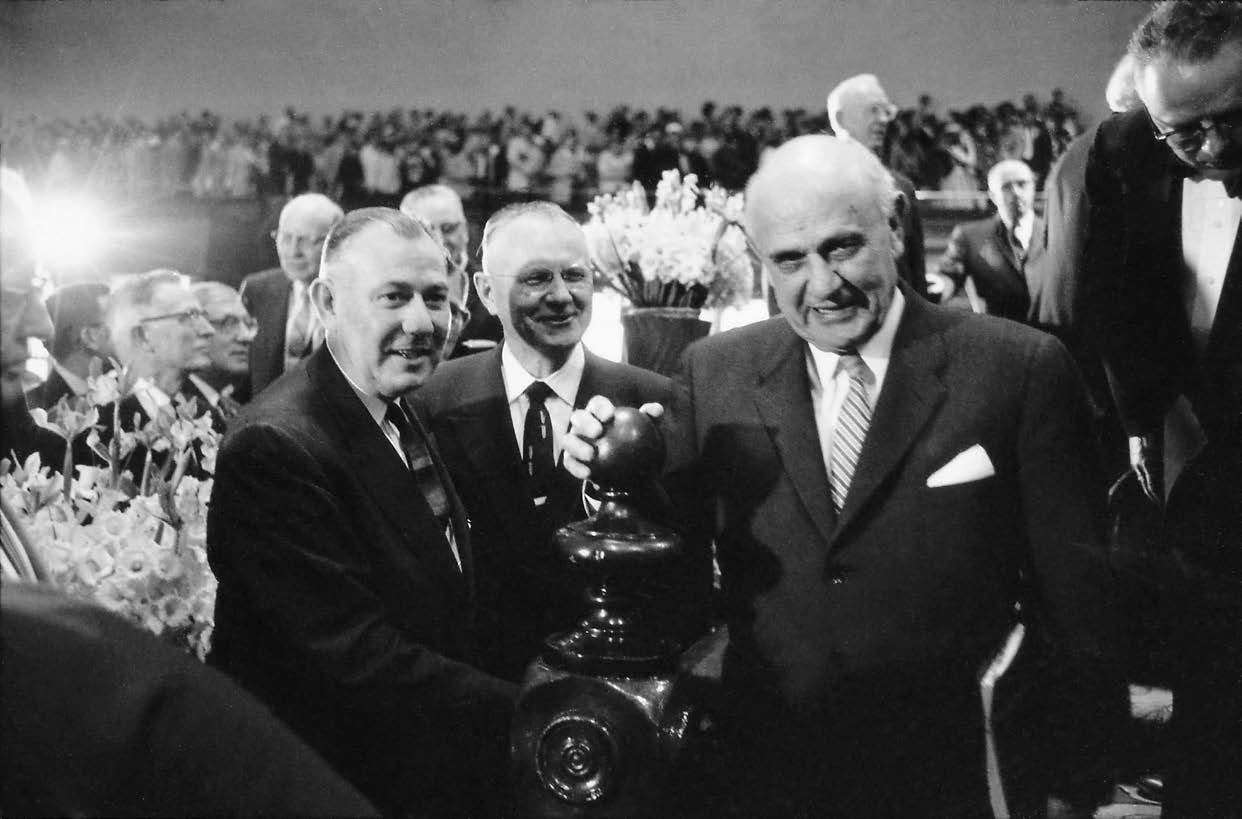 Stephen L richards at the Salt Lake Tabernacle during the April 1958 general conference. Courtesy of CHL.
Stephen L richards at the Salt Lake Tabernacle during the April 1958 general conference. Courtesy of CHL.
One day my friend, the minister, met this young man coming down the street. He recognized him some little distance before they met. The young man offered his hand in greeting, but the minister rejected the offer, and he said, in substance, to the young man: “John, I rebuke you, and in the authority of my ministry I command you to cease the terrible practices which are ruining your home and bringing such sorrow to your loved ones.” With these words the minister left the young man, confused and shocked, standing on the sidewalk. My friend told me that after he had gone a short distance he was tempted to go back and apologize. He said that he had never done such a thing before, and he could not understand how he had come to speak such seemingly cruel words to one of his friends for whom he felt such responsibility.
When he had finished telling me of the incident, I picked up a volume which I had with me, and I read to him these words:
“No power or influence can or ought to be maintained by virtue of the priesthood, only be persuasion, by longsuffering, by gentleness and meekness, and by love unfeigned;
“By kindness, and pure knowledge, which shall greatly enlarge the soul without hypocrisy, and without guile—
“Reproving betimes with sharpness, when moved upon by the Holy Ghost; and then showing forth afterwards an increase of love toward him whom thou hast reproved, lest he esteem thee to be his enemy;
“That he may know that thy faithfulness is stronger than the cords of death.” (D & C 121:41–44.)
“That’s it, that’s it!” the old minister said to me excitedly. “Where did you find that?” I told him that it was part of a revelation concerning the nature of the Holy Priesthood, given to the Prophet Joseph Smith more than a hundred years before this conversation took place. The minister then told me that after he had given the rebuke to the young man, a few weeks passed, and the man came to him and thanked him, and said to him, “All the pleading of my family and friends made me sorrowful but did not bring to me the courage to act. That rebuke which you gave to me that day on the street has given me a strength that I could not acquire before. I have never taken a drink since, and I have the resolution and the faith to believe that I never will again.”
It is a kindness to reprove in the spirit of love. It is an unkindness to mitigate the gravity of offenses in those for whose guidance and direction we have responsibility.
Irene M. Richards Letter[73]
S. S. Argentina
March 29, 1948
Dear Louise:[74]
Won’t it be nice to see Lois? I wonder what kind of a hat she will wear. It’s really after Easter. The wind has blown constantly so my hats are about spoiled. People don’t wear them here. I suppose you have three or four new ones since I left? What did you do for Easter and who rolled what eggs on which lawn? There were about a dozen hatted ladies who paraded here on deck and one man with a balloon for fun. Papa gave the Easter speech and it was delightful. Others said so and many have expressed themselves to us this morning. There was quite an audience. Some young man sang and led the songs: he rendered “The Lord’s Prayer” beautifully.
We crossed the equator and it was hot. We are glad for the breeze. Some flying fish are about. Such tiny silver things. Some big black propoise [porpoise] were playing yesterday. There are white caps most of the time. The clouds change continually. We don’t have much sunshine and the moon is not visible much. I think as we get away from shore it’s so. The sunsets are not as they were near shore either. The astronomer is going to tell us about the stars, if the weather permits tonight. The moon has another face as we now see it.
I suppose we never will see the time again when we haven’t a thing to do but watch the sea, sky, people playing deck games, and sunning themselves and filling the pool, and parading the deck, playing cards, eating, drinking, etc., as we see this last week of our cruise. I am satisfied it’s a waste of time. How some people can do nothing much all their lives and do any good to themselves or others I can’t judge, I guess. . . .
Anyway the meals are still elegant after the abominable cooking of South America. We do enjoy this boat. The worst of it I eat too much good bread and butter. The milk is still canned or powdered. So when we see a good cold Arden bottle of milk we will be happy. I wish you and Steve could finish out this last week for us. I can’t read, it makes me sick, but I can write, and will get all my letters ready to mail, so they will beat me home. Stephen is playing shuffleboard and rather excels. It’s intensely interesting to observe the variety of characters about us, and some darling children who are just their sweet selves. We trust spring will be just around the corner and that you are all well and happy. We hope it will be cooler from now on.
Lovingly,
Mother and Father.
Notes
[1] Irene Richards, Dear Children, March 11, 1948, Lynn Stephen and Annette Richards Family Papers, CHL.
[2] Irene Louise Richards Covey was the Richardses’ second child.
[3] Trip itinerary, March 10, 1948, Stephen L Richards Papers, CHL. Some adjustments were made to this itinerary since the Richardses ended up flying in an airplane.
[4] Irene M. Richards, Journal, March 8, 1948, Lynn Stephen and Annette Richards Family Papers.
[5] Gerrit de Jong Jr. spent the academic year of 1947–48 serving the US government as director of a cultural center in Santos, Brazil. He was a professor of languages and music at Brigham Young University and became the first dean of the College of Fine Arts. “Gerrit de Jong, Jr.,” BYU College of Fine Arts and Communications, last modified July 22, 2015, https://
[6] Richards, Dear Children, March 11, 1948. The excerpt was written at a later date but describes this time period.
[7] Irene Louise Richards Covey was the Richardses’ second child.
[8] Richards, Dear Children, March 10, 1948.
[9] Alice “Allie” Leila Richards was the Richardses’ fourth child.
[10] Mormon Preacher is an unidentified São Paulo newspaper, 1948, Stephen L Richards Papers, 1921–59.
[11] Perhaps a misunderstanding of the reporter since Elder Richards had already traveled to Argentina.
[12] São Paulo District Minutes, March 9, 1948, Stephen L Richards Papers.
[13] The Church in Brazil first started in São Paulo on May 19, 1935, when mission president Rulon S. Howells held a meeting with three Church members. See South American Mission Manuscript History and Historical Reports, CHL.
[14] Minutes of Mission Presidency Meeting, March 10, 1948, Stephen L Richards Papers.
[15] Richards, Dear Children, March 10, 1948.
[16] Georgia Gill Richards was the Richardses’ sixth child.
[17] For more cultural information about Brazil, see the seminal work Nicolás Sánchez-Albornoz, The Population of Latin America: A History, trans. W. A. R. Richardson (Berkeley: University of California Press, 1974).
[18] Richards, Journal, March 10, 1948.
[19] Campinas is located about 55 miles (88 km) from São Paulo.
[20] See “Like a Dream,” Church News, October 18, 1997, 16. The first members of the Campinas Branch were baptized on June 4, 1942, and included Rute Mendes, Alfredo Lima Vaz, Remo Roselli, Walter Carmona, and Flavia Garcia Erbolato. Alfredo Vaz was Campinas Branch president and local missionary at the time of the Richardses’ visit.
[21] W. Ernest Young to S. L. Richards, March 10, 1948, Stephen L Richards Papers.
[22] Richards, Journal, March 12, 1948.
[23] The phrase “road was a” was inserted above the word drinking.
[24] Grant C. Tucker, Journal, March 12, 1948, CHL.
[25] Frederick H. Dellenbach, Journal, March 14, 1948, Frederick H. Dellenbach Papers, CHL.
[26] Dellenbach, Journal, March 14, 1948.
[27] Richards, Journal, March 13, 1948.
[28] Evelyn Beck recalled, “I remember President Rex called and asked if I’d take care of their baby while they toured up into Piracicaba and Americana, wasn’t it? Remember how we polished that house? We had to use that hand buffer, and we polished those ten rooms with that red wax. We had everything just spotless. They were coming early the next morning. And it started to rain. Before we could get our shutters closed, our downstairs was just covered with water. We had to dip it out with buckets. He [Elder Richards] came the next morning. We had all of our things draped over chairs and barrels because it had just soaked everything.” Wayne M. and Evelyn M. Beck Oral History, interviewed by Gordon Irving, January 17–31, 1974, 29, CHL.
[29] “Campinas Is Host to One of the Most Eminent Figures of the Contemporary Religious World” [n.d.], 1948, Stephen L Richards Papers.
[30] “A Representative of The Church of Latter-day Saints in Campinas,” March 14, 1948, Stephen L Richards Papers.
[31] Evelyn Beck letter, March 15, 1948, Wayne M. Beck Papers, in private possession. Evelyn and Wayne Beck served as missionaries with their young family in Brazil after the Second World War. Wayne Beck had already served a mission in Brazil and was the first counselor to President Harold Rex.
[32] The Becks added this detail about the baptismal service in an oral history. Evelyn: “When we got there—didn’t we go out on a bus out there?—and the sun came out. I’ll never forget how impressive that was. And it impressed Sister Richards too. She was with him and she just couldn’t get over that.” Wayne: “It rained all the way out and all the way back.” Evelyn: “But during that time of the baptism the sun came out. It was just beautiful.” Wayne M. and Evelyn M. Beck Oral History, 29.
[33] Dellenbach, Journal, March 14, 1948.
[34] Richards, Journal, March 14, 1948.
[35] Possibly butterflies.
[36] John A. Alius, “Elder Richards Ends Trip with Tour of Brazilian Mission,” Church News, April 3, 1948.
[37] For more on the history of the Church in Brazil, see “The Church in Brazil,” Ensign, February 1975.
[38] Richards, Journal, March 15, 1948.
[39] Curitiba is in the state of Paraná. Missionary work began in the city in 1937. See Brazil São Paulo North Mission Manuscript History and Historical Records, CHL.
[40] Written at the top of the journal page.
[41] Richards, Journal, March 16, 1948.
[42] Reinhold Stoof, South American Mission president from 1926 to 1935, visited Brazil in 1927 and gave a lecture in Joinville about the Church to German immigrants. He sent missionaries to southern Brazil in 1928. The first branch in Brazil was organized in Joinville on July 6, 1930, among German-speaking Saints. The first Church-owned meetinghouse in South America was dedicated on October 25, 1931, in Joinville. See South American Mission Manuscript History and Historical Reports.
[43] “Religious Movement,” A Noticia (Joinville, Brazil), March 16, 1948, Stephen L Richards Papers.
[44] Brazil São Paulo North Mission Manuscript History and Historical Reports, March 16, 1948.
[45] Chile was part of the original itinerary, but the Richardses did not visit there.
[46] Richards, Dear Children, March 10, 1948. Letter to daughter Georgia. The letter was started on March 10 and then continued with events up to March 16.
[47] Richards, Journal, March 17, 1948.
[48] Missionaries held their first meetings in Curitiba in 1937. See São Paulo North Mission Manuscript History and Historical Reports.
[49] Brazil São Paulo North Mission Manuscript History and Historical Reports, March 17, 1948.
[50] Missionary work began in Porto Alegre in 1933. See South American Mission Manuscript History and Historical Reports.
[51] Milton R. Bloomquist to Mr. and Mrs. Ira D. Gagon, March 27, 1948, Milton R. Bloomquist Papers, CHL.
[52] Stephen L Richards was sixty-eight years old.
[53] The Richardses did not visit Paraguay or Chile on their trip.
[54] Richards, Journal, March 18, 1948.
[55] Richards, Journal, March 19, 1948.
[56] President Rex likely showed a photograph of his daughter named Yara.
[57] Reference to the movie “Flying Down to Rio” that paired Fred Astaire and Ginger Rogers for the first time.
[58] Minutes of Mission Presidency Meeting, March 19, 1948, Stephen L Richards Papers.
[59] Thayle H. Nielsen served as second counselor in the Brazilian Mission presidency from 1948 to 1949.
[60] Missionaries visited German members in Rio Preto and baptized the first converts in 1931. This later became the Rio Preto Branch and then the Ipomeia Branch. See South American Mission Manuscript History and Historical Reports; Ipomeia Branch Manuscript History and Historical Reports, 1935–83, CHL.
[61] Richards, Dear Children, March 20, 1948.
[62] Alice “Allie” Leila Richards Allen was the Richardses’ fourth child.
[63] She was born on March 17. The rest of the material in this paragraph pertains to that date.
[64] For information about the challenges of opening up the Brazilian interior, see E. Bradford Burns, A History of Brazil (New York: Columbia University Press, 1993), 48–61.
[65] Reference to the 1933 movie musical starring Fred Astaire and Ginger Rogers.
[66] Richards, Journal, March 21, 1948.
[67] The Corcovado is the hill with the statue of Christ that overlooks Rio de Janeiro.
[68] Jeanne Joyce Larson. Her husband, Rolf Larson, was employed by the US government in Rio de Janeiro and was a former Argentine missionary. See Williams and Williams, From Acorn to Oak Tree, 242.
[69] Richards, Journal, March 22, 1948.
[70] Richards, Journal, March 23, 1948.
[71] Richards, Journal, March 25–28, 1948.
[72] Stephen L Richards, in Conference Report, April 7, 1957, 96–97.
[73] Richards, Dear Children, March 29, 1948.
[74] Irene Louise Richards Covey was the Richardses’ second child.
